Loc8me admits discussing house prices with other le ing agencies
Daniel Hodgson News Editor

Le ing agent Loc8me has admi ed to speaking to other le ings agents regarding increasing their rent prices for the 2023/24 year, in an audio recording made by a Palatinate reporter.
The dialogue that took place was between one of the Loc8me agents and the reporter, surrounding next year’s student housing arrangements and the justification for rises in rent on a large number of properties.
During the conversation, the member of the Loc8me team said: “So what you’ll see is that, you know most agents advertise with bills included, the prices are going up to try and compensate for the, obviously the prices are going up and it’s basically to try and compensate for that.”
This justification for increasing prices was furthered by the following statement: “So our prices are going up to kind of reflect that, you know, we spoke to the other agents and they are as well.”

Given its contents, the recording raised concerns as to whether this behaviour was in the spirit of the law. Any agreement between the agencies would be in breach of the 1998 Competition Act, whereby anticompetitive agreements between businesses are prohibited.
This aims to ensure that business remains competitive to maintain consumer choice.
The Chartered Trading Standard Institute was consulted regarding the legality of this behaviour, however the Institute was unable to give a firm answer on whether Loc8me’s actions as described in the recording were legal.
Loc8me were contacted for comment regarding their admission on talking to other le ing agents regarding price increases. They declined to do so. Following this, they were asked about their view on the Chartered Trading Standards Institute’s comments. They had not responded at the time of going to print.
A L A T I N A
“There’s not enough space in this tiny city”: students queue overnight to secure housing
Emily Doughty and Holly Barry News Editor and News Reporter
Students have felt “forced” to queue outside housing agencies overnight to secure housing for the next academic year as chaos continues to surround accommodation, with anger at Durham University over the situation growing.

Students who spoke to Palatinate described how they “missed lectures” to queue outside Frampton and Roebuck’s office to secure their houses for next year in fear they would have to pay higher prices, with one student saying that the situation was so desperate that they “didn’t want to to be left having to pay extortionate prices or be homeless.”


One group, who had queued from midnight to secure a five-bedroom house, had said they felt if they had not queued their only other option was to pay upwards of £200 per person per week to live somewhere else.
They also said those down the line were unable to secure the house they wanted, and were forced to pay more than they wanted forcing some members of their group to pull out.
Another said that they were “forced to sign documents on the actual pavement or against the shop windows” after being told by the le ing agency that they “had to do it right then.”
This panic has meant that many students have signed for houses earlier than previous years, with houses being signed during the first
week of term. One student who signed early in term said they had “to rush as soon as I got back” to secure their housing for next year.
University accommodation is also becoming some students’ only option, with one saying that if they are unable to get into college accommodation this year they will be priced out of Durham.
This sentiment was shared by many, with another student saying that “college accommodation is the only option if I get it, if not I don’t know what I’ll do.”
However, for some college accommodation is too expensive to be a viable alternative. One student, who is on the maximum maintenance loan, says that at the current level “college accommodation is costing £3,023,
leaving me with £6 a term.”
The price of college accommodation for the 2023/2024 academic year has not been released, with the price rise being announced in November.
Students have voiced their anger at the situation to Palatinate, with one saying that “students should be able to se le into their academic studies and have the opportunity to make friends to live with for their future years.”
Other students have turned to social media as a means of voicing their frustration with the current crisis; second year student Katerina made a TikTok on the situation which gained nearly 7,000 likes on the app.

The UK and Ireland’s Best Student Publication, 2021 FREE www.palatinate.org.uk
Students waited in line for over 15 hours at Harrington’s, with similar queues elsewhere as lists were released (Emily Doughty)
Continued on page 4 Profile speak to Benjamin Zephaniah p13 p10 Comment discuss the University’s Cost of Living advice P
TE Thursday 27th October 2022 | No. 854
House of Horrors
OnSunday evening, after leaving the SU at around 8:30, we ran into the queue outside Harrington’s estate agents. Students had brought chairs and warm clothes, food and laptops; they were watching Toy Story
They had planned this after the queues seen last week at other agencies, arranging for a friend with a car to arrive later in the night so that each member of the group could nap for a period, before returning to the line to relieve another. Some were planning to go clubbing and return for the early hours.
By the morning, as has been well documented in these pages and elsewhere, the queue stretched far around the corner and through the surrounding roads. To add insult to injury, many groups reached the front of the queue to find preferred houses already signed, with those remaining out of their budget or the wrong size.
The idea that students should be missing training sessions, extracurricular activities and even academic classes to prepare to sign housing contracts is unjustifiable. If this is the wider student experience Durham University would like to sell, it will surely find fewer buyers.
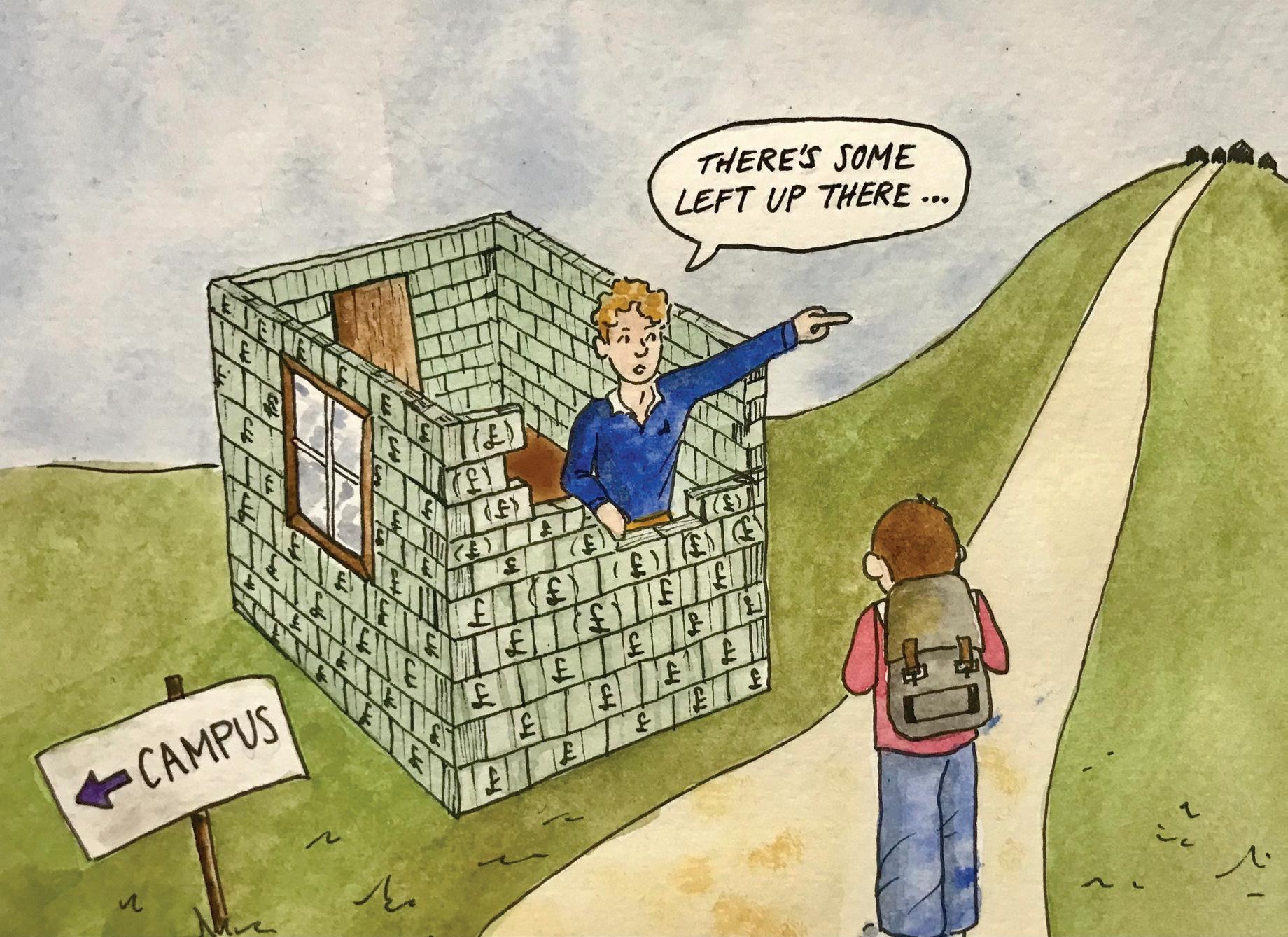
Despite rampant inflation across the country and global
events which contribute their share of hardship, the University should not be allowed to escape blame. Ten years ago, at the outset of the 2012/13 academic year, there were just under 10,000 undergraduate students on the Durham campus, growing steadily but fairly reasonably to around 12,300 by 2017/18.
by around 30% in this time. Sustainability this is not, and these numbers do not represent the 2021/22 year, when the impact of paid deferrals and grade inflation would likely have combined to raise student numbers even further.
Given this bulging population, it is no wonder that housing is in relatively short supply and prices rising at unprecedented rates. The University must take its fair share of the blame for this; its need for growth, with the extra revenue this brings, rapidly overtaking student welfare.
It is also worth noting at this point that housing does exist, and it is not the case that those who do not camp out overnight will not secure a house for next year. However the narrative of panic that now surrounds Durham’s housing market has clearly led many to take extreme measures, with li le leadership from the University to allay concerns.
From this point, the intake has shot up, with total undergraduate student numbers increasing to just shy of 16,000 in the year 2020/21.
To put this into perspective, the institution grew its undergraduate community
Perhaps there will be an intervention, even gradually, which reduces student numbers to manageable figures, any growth plans tackled sustainably. Expecting this, however, may be as wise as anticipating the South College incident investigation report in the inbox tomorrow morning.
More likely is a scenario where the University allows the undergraduate intake to
balloon, where any support available through colleges is insignificant, where prices are pushed up further in this small city and where the student experience suffers fatally as a result. There may well be housing in far flung areas of the city, perhaps even further into the county, but this could become more of a hindrance than a help to desperate students. The further someone has to walk home, the less likely they will be to stay on campus for recitals, rehearsals, formals and other college events. The wider student experience is undermined not only by the lessons missed to queue for housing, but the marginalisation of students that will have a far greater impact over the course of a degree.
Joe Rossiter Editor-in-Chief

Editors-in-Chief
Joe Rossiter & Nicole Wu editor@palatinate.org.uk
Deputy Editors
Elle Fitzgerald-Tesh & Adeline Zhao deputy.editor@palatinate.org.uk

News Editors
Daniel Hodgson, Emily Doughty & Waseem Mohamed news@palatinate.org.uk
News Reporters
Charis Lim, Anna Calzada, Freddie Corrin, Holly Barry, Katie Keillor, Nina Bu erfield, Paul Ray, Louisa Barlow & Tiffany Chan
Investigations Editors
Frank Kelly & Emily Lipscombe investigations@palatinate.org.uk Satire Editors
Sascha LO & Rory Cronin satire@palatinate.org.uk
Comment Editors
Josie Lockwood & Josie Sherman comment@palatinate.org.uk Deputy Comment Editors


Holly Downes & Duru Akin Profile Editors
Christian Vince & Arjun Seth profile@palatinate.org.uk Science & Technology Editors
Cameron McAllister, Patrick Stephens & Will Brown scitech@palatinate.org.uk
Politics Editors
Madeleine Ballay & Jacob Cousens politics@palatinate.org.uk Deputy Politics Editors
Sebastian Braw-Smith & Guy Seagers Puzzles Editor

Sophie Sherra puzzles@palatinate.org.uk
Sport Editors
Oliver Jervis & Sanjay Suri sport@palatinate.org.uk Deputy Sport Editors
Maddie Parker & Joe Harston Indigo Editors
Samuel Lopes & Miriam Mitchell indigo@palatinate.org.uk Deputy Indigo Editor
Melissa Rumbold Features Editors
Isobel Tighe & Roshni Suresh Babu features@palatinate.org.uk
Creative Writing Editors
Theo Mudhir & Elizabeth Buckley creative.writing@palatinate.org.uk
Stage Editors
Alexa Thanni & Amelie LambieProctor stage@palatinate.org.uk Visual Arts Editors
Cameron Beech & James MacFarlane visual.arts@palatinate.org.uk
Books Editors
Ruhee Parelkar & Annie Pickup books@palatinate.org.uk Style Editors
Agnes Shu & Caitlin Ball fashion@palatinate.org.uk Food & Drink Editors
Millie Adams & Eve Kirman food@palatinate.org.uk
Travel Editors
Lydia Doye & Lily Lake travel@palatinate.org.uk
Film & TV Editors
Charlo e Grimwade & Alice Purves film@palatinate.org.uk
Lara Moamar & Emilia Williams indigo.interview@palatinate.org.uk
Thomas Tomlinson & Nathan Becke photography@palatinate.org.uk
Rosie Bromiley, Victoria Cheng, Anna Kuptsova & Isobel Warwick illustration@palatinate.org.uk
Palatinate is published by Durham Students’ Union on a fortnightly basis during term and is editorially independent. All contributors and editors are full-time students at Durham University. Send le ers to: Editor, Palatinate, Durham Students’ Union, Dunelm House, New Elvet, Durham, DH1 3AN. Alternatively, send an email to editor@palatinate.org.uk.
Interview Editors
Photography Editors
Illustration Editors
Social Media Officer Amy Whitaker Business Manager Thomas Simpson advertising@palatinate.org.uk Deputy Business Manager Lisha Chen Palatinate Editorial Board 2 Thursday 27th October 2022 | PALATINATE Editorial
(Rosie Bromiley)
The narrative of panic that now surrounds Durham’s housing market has led many to take extreme measures Inside 853 1-7 News 8 Satire 9-11 Comment 12-13 Profile 14-16 SciTech 17-19 Politics 20 Puzzles 21 Agony Aunt 22-24 Sport Indigo 2Editorial 3Style 4Stage 5Film & TV 6-7Music 8Food & Drink 9Travel 10-11Visual Arts 12Interview 13Features 14Creative Writing 15Books
Delays, miscommunications and cancellations: switching to Claypath and University Medical Group
Emily Lipscombe Investigations Editor
Content Warning: Mentions of depression, eating disorders and suicidal thoughts.

A number of students have detailed their difficult experiences of making the transition from their hometown General Practice (GP) to the Claypath and University Medical Group, as part of a Palatinate investigation into the service in Durham.
This transition, encouraged by the University in anticipation of students’ arrival in Durham, is intended to give students guaranteed access to appointments and medication at either the Claypath or University practices. The option of registering as a temporary patient at their previous GP practice remains if appointments are required at home.

However, many students have found this process incredibly convoluted, resulting in delayed medication, renewed waiting lists, and many having to choose to remain registered with their hometown GP. In particular, students on longer-term or preexisting treatments for mental health conditions, chronic physical health conditions, or recovering from injury or illness, have found that the transition has caused serious negative or prohibitive impacts on their wellbeing.
A third student who had chosen to remain registered with their home GP has also expressed difficulty in becoming a temporary patient with the Claypath practice: “I have a complex medical history so wanted to keep my home GP. But, earlier this year I got tonsillitis and wasn’t ge ing be er for weeks.
and playing a range of sports when I’m not suffering, nothing has been done. I’m still in pain.”
me my medication.
One recurring issue mentioned by students was the difficulty with the initial registration process for the Claypath and University Medical Group. One student explained how it took two months to start her antidepressant prescription with the Claypath practice: “I’m from Scotland, so different service, but I signed to Claypath two months before starting uni and when I got there they kept saying they had no record of me having a prescription for antidepressants, even though my GP in Scotland sent multiple messages to them transferring my information. I would have to go home every other week to pick up my prescription. It was a nightmare.”
Another student registered for the Claypath practice during Freshers Week in 2021, but was only successfully registered with the service after eight weeks, which was an issue as the student said: “I had prescriptions which I needed a lot and I was not able to get them.”
“The GP in Claypath refused to see me unless I registered permanently, wouldn’t let me temporarily register and told me to get a phone appointment with my home GP. [The] Home GP understandably said they can’t help me over the phone and that Claypath had a duty of care. But, they still refused to see me. I temporarily registered with a GP in Gilesgate in the end and needed antibiotics.”
Once registered at the Claypath and University Medical Group, many students still experienced severe delays in their treatment for a number of serious health issues. Beyond a simple inconvenience, many students who experienced delays said this had a debilitating effect on both their studies and quality of life.
One student, who has since graduated, detailed their experience last year in seeking treatment for severe back problems: ”I had agonising back pain for weeks on end [and was] taking daily ibuprofen. This was during my Epiphany and Easter term, including exams. I put in a request for a meeting in March and only yesterday [7th September 2022] did I get a phone call.
“I had completed my degree before they could give me a phone call just to tell me to move more. Despite me doing daily exercise
Another student had similar issues with delayed communication from the practice last year, this time concerning “le ers for appointments delivered months late”, resulting in those appointments being missed. They explained that “because I switched GP to Durham, I was unable to access mental health services in London over the summer. I have since switched back to my former GP surgery but am now concerned about access when I return again to Durham. Quite the nightmare.”
A student’s experience with antidepressant withdrawal - a result of a call being cancelled by their GP - exemplified just how debilitating an absence of care can be for vulnerable students:
“The Monday after, I phoned again and (after about 50 phone calls) was given an appointment, but the GP never called; I was told that they had cancelled. Fortunately, they managed to sort it the next day, but this experience left me with four days deprived of the antidepressants basically allowing me to function as a normal human being.
“TCA (tricyclic antidepressent) withdrawal symptoms include physical debilitation, psychosis, and suicidal thoughts — all of which I was enduring throughout peak formative/summative season for at least a two-week period. This has had an irreparable effect on my uni experience this year. And it all could have been prevented if the GP surgery was more organised.”
Mental health and counselling waiting lists have also proved to be long, leaving students struggling to cope in the meantime. One student, who is on a waiting list for sexual assault and rape recovery, has to wait nine months for treatment.
“I was first prescribed antidepressants in February of 2021, and since then my dosage has been increased twice. Ge ing onto the list itself took two months due to blood tests, weight, height and ECG assessment, and the waiting list time for therapy was given to me as 30 weeks. I had not received any therapy before coming to Durham in September 2021.
“Earlier this year, my antidepressant repeat prescription request was declined. (I misplaced my meds, it happens). Upon phoning, the reception was unable to offer me an appointment that day to reissue my prescription — because I ‘hadn’t called at 8.30 on the dot’. I was told that I’d have to wait until the next working day (three days later) to phone to book an appointment, and that there was nothing they could do to give
They added: “I also have severe depression and anxiety and have been on the counselling waiting list for seven months bearing in mind I couldn’t complete some of my exams [scheduled in Easter term] due to this and missed a huge amount of classes.”
One student found their waiting list progress directly affected by the transition from the hometown to Claypath GP. At the time of their testimony, they stated: “I have suffered from an eating disorder for eight years, and have been seeking treatment for about two years. I also sought treatment for depression at the same time.
“The process has had to restart since switching practices. I got a call from my local GP and I was told that although it said on the university website that I could be registered at Durham, but still use my local GP in the holidays, this wasn’t the case. My GP phoned me up and told me that because I had moved I would have to restart the eating disorders process in Durham.
“By this time I had already been waiting nine months with no therapy. I have a basic assessment coming up this month, but this, along with every interaction I’ve had, including discussion on upping dosages, besides my first appointment, has been over the phone.” They later added that they had since been forced to resort to using private therapy.
Palatinate has reached out to Claypath and University Medical Group for comment.





 Claypath Medical Centre, which is one of two general practices operated by the Medical Group (Roger Smith via Wikimedia Commons)
Claypath Medical Centre, which is one of two general practices operated by the Medical Group (Roger Smith via Wikimedia Commons)
3PALATINATE | Thursday 27th October 2022 News
The GP in Claypath refused to see me unless I registered permanently
PALATINATE INVESTIGATION
This has had an irreparable
eff
ect on my Uni experience
I had already been waiting nine months with no therapy
Analysis: Durham among most expensive places in

for students to live in after rent increases
A Palatinate investigation has found that Durham is now one of the most expensive cities in the North of England for housing. Using data collected from the student rental site Sturents, Durham was found to have the most expensive cities in the North East when compared to cities like Newcastle, Manchester and Liverpool.
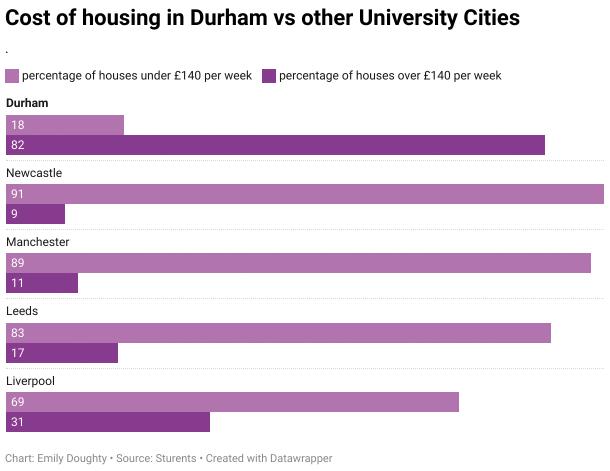
Durham housing prices have risen exponentially this academic year, with over 85% of properties now costing over £140 a week.
However in Newcastle, which is only a 15 minute train journey from Newcastle only 9% of houses available were over £140 per week, with most being under £140.
A similar pa ern can be found in other major Northern cities such as Manchester, Leeds and Liverpool where in all cases the number of houses under £140 per week outnumbered the number of houses over £140.
Liverpool, which had the highest percentage of houses over £140 per week in the cities surveyed by Palatinate, with 31% of houses being over £140 per week still had 56% more houses under £140 than Durham.
Even compared to last year Durham housing has risen significantly in price. While last
year over a quarter of the houses were under £120 per week, this year not even 3% were under that price. This increase is already being seen by students, with one student saying that their house has “gone up from £135/week to £175/per week and we have black mould in our shower”. as risen from “£160 (per person per week) to £225 all without bills included” When they asked for justification for this rise they were told it was because the landlord needed to be “comparable to other landlords” and “remain competitive”
Some students who were also planning to stay in the same house next year have also been priced out of their homes. A student who spoke to Palatinate said that the cost of their house was increasing from £86 per week to £189 per week.
When they asked for justification they were told that “this increase is that the landlords will be paying out bills, even though we’re only spending £20 a week on bills currently. They also claim that the increase is due to future renovations and adding an extra room, but we cannot see how an extra room can be added when there’s such li le space”
They went on to say “there’s no acceptable reason behind such a gude increase, the landlords and agencies are just pocketing our money. We knew the prices would rise, but we didn’t expect to be priced out like this.”
Students say they weanger towards Unive
continued from front
Another, Jacob Vellucci, spoke about his concern that the increase in price will “completely push out working class students and low income students.”
However much of the anger of the students was directed towards the University, who many blame for the current situation, with one saying that that the Universiy just needs to “stop fucking accepting students” as “there’s not enough space in this tiny city.”
This was echoed by others who said that “It’s ultimately the University’s fault for le ing too many people in.”

The University has seen increased numbers over the last couple of years, something exacerbated by the cancellation of exams due to Covid-19 which saw more people receiving the grades needed to reach their offer.
However this number is only expected to grow, as The University
strategy plan, which is set to be completed by 2027, would see the student population increase to 21,500. This means the University hopes to add another thousand students in the coming years.

Many believe the University is also not doing enough to stop the situation saying that “Durham university should do something about it, it’s a travesty” and that they “haven’t got a handle on it.”
For many students this lack of care comes from the idea that to the University students are only a “money making scheme. We’re numbers and a bank loan.”
The University’s lack of action is also believed to be harming low income and working class students, many of whom are disproportionately impacted by the rise in prices, with one student saying “if the uni care about inclusivity they would care about their students missing lectures to stand in line because they just can’t afford to live here.”
Another student who spoke to Palatinate said that the failure of the University to provide housing shows their lack of care for working class students saying, “they can’t claim they’re trying to increase their state school ratios if they can’t support these students.”
a statement to Palatinate

4 Thursday 27th October 2022 | PALATINATE News
the North
Students crowd outside le ing agents Robinson’s following their housing release, with some electing to sig
It’s ultimately the University’s fault for le ing too many people in
Emily Doughty News Editor
In
a
Durham University spokesperson
breakdown
the cost of housing
In a breakdown done on the cost of housing by Palatinate, 37% of housing cost over £200 per person per week, compared to the less than 1% of houses were under £100 per person per week.
Houses over £200 were also found not to be contained to one area of Durham, with £200 houses being found in Gilesgate,
Using data from the student housing site, Sturents, Palatinate found that 20% of houses were between £140 to £160 per week, 17% were between £160-£180 per week and 13% were between £180-£200 per week.
The most expensive house on the market was £500 per week per person, excluding bills. The cheapest house was £60
Postgraduates likely to be worst aff
by housing shortage
re forced to sign a house asrsity’s lack of action grows

said “We work hard to support our students across both academic and non-academic ma ers, including working with Durham Students’ Union and student leaders as appropriate.”
Local leaders have also spoken out against the chaos with Mary Kelly Foy, City of Durham MP.
She is offering her support to students saying, “Durham’s private rental market simply isn’t working for students or residents. The cost is spiralling faster than student loans or wages can keep pace with. The quality and condition of many houses is poor. Now a huge spike in student numbers has placed severe pressure on availability, resulting in the ludicrous scenes we saw outside Frampton and Roebuck.
Housing pressures have been bubbling in the city in recent years, and I am concerned that the expansion of the university has caused this to boil over. Its unfair on students and residents. Students deserve an affordable and decent
standard of accommodation while they study in our wonderful city, while local residents should not be priced out of their home. I fear at present both residents and students are being exploited for huge financial gain during the cost of living crisis.
raising these issues nationally in Parliament and locally with the County Council in the coming weeks. I would encourage any student with concerns to contact me.”
Durham County Council were contacted for comment on whether they believed that any of the blame for this situation lay with them, specifically in relation to their plan that aims to deal with the ‘studentification’ of the city. Palatinate reported on this in May, with regards to one potential property extension in Whinney Hill.
In this individual case, Palatinate also reported that “The Chairman of the Area and Planning Commi ee (Central and East), Councillor David Freedman, also argued for the plan to be refused on the basis of the plans going against the Council’s policy to achieve a be er age balance in the city”. It was put to the Council that this a itude may cause problems going forward with an ever-increasing number
of students, but not the housing availability to match.
Michael Kelleher, Durham County Council’s head of planning and housing offered his support, while also highlighting issues facing the local residents: “We are proud that our city is home to a world-class university, and we work closely with the organisation to understand its student numbers and accommodation requirements. However, as an authority we also have a responsibility to ensure that the scale of student numbers does not significantly impact on the city and its residents.
“The County Durham Local Plan serves to deliver student accommodation in line with our commitment to creating inclusive and balanced communities. We are supportive of a range of student accommodation and will continue to approve applications where they are appropriate and meet the conditions of the local plan.”
While the Durham housing rush for undergraduate students has received much a ention, the crisis will likely feel worse for Durham’s postgraduate students who arrive next year.
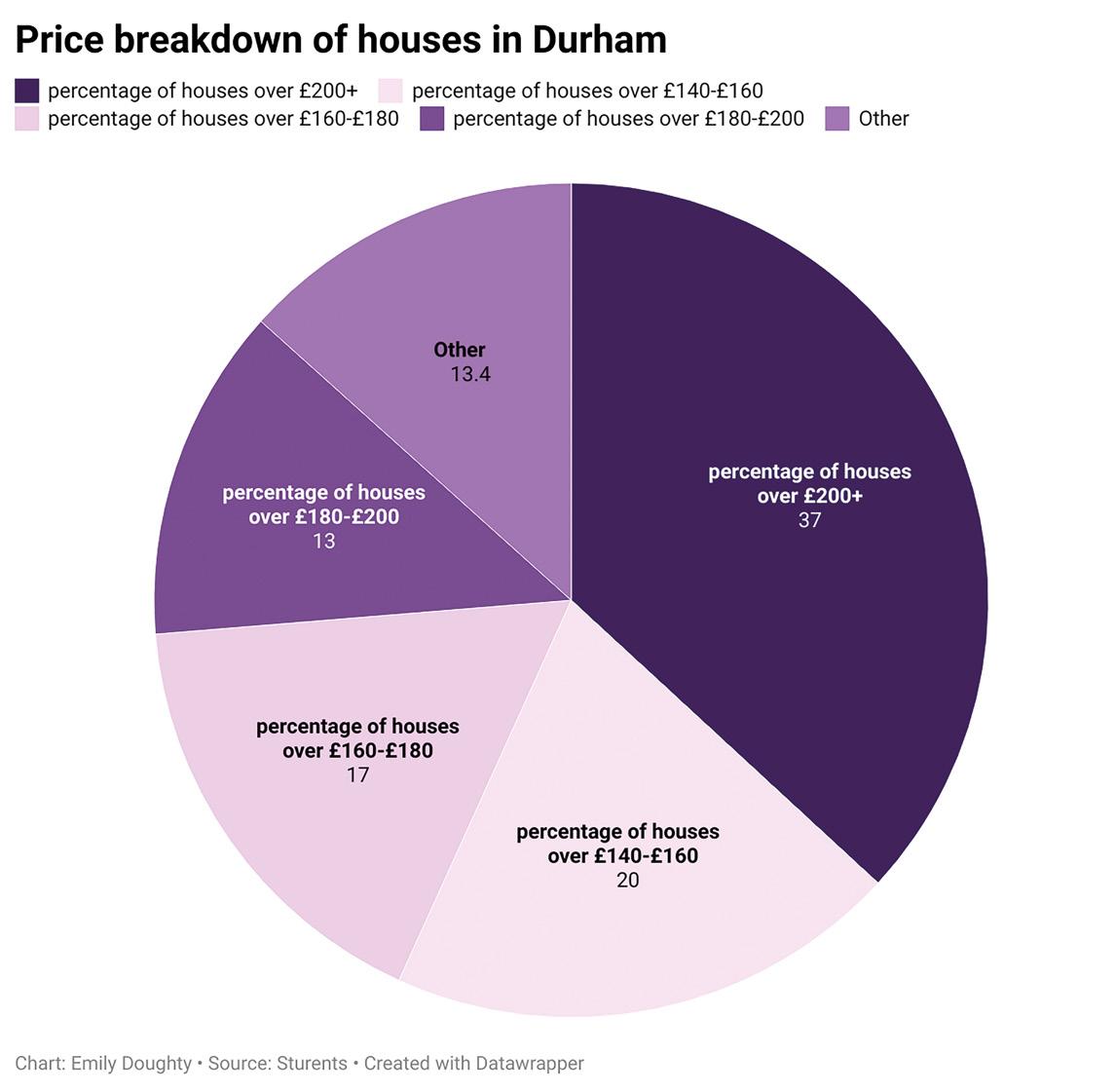
Many prospective postgraduates have not yet received their offers to study, and they are also not guaranteed university accommodation. This therefore leaves them with the choice of living in expensive private accommodation in Durham, or be forced to look further afield for a room.
Many postgraduates are forced to live outside of Durham, where transport links are often not as strong, leading to isolation.
A student speaking on the anonymous Facebook page Durfess said: “There is literally zero private housing in Durham, and the colleges are full…there are multiple posts every day on Find a Housemate/Overhead from desperate students needing a place to stay, some resorting to hotels and commuting from Newcastle”
Even those who are able to secure University accommodation are still faced with the high cost of it. Ansh Bhanagar, a PhD researcher at Durham, highlighted the cost of university accommodation for PGRs by tweeting: “Durham University does not offer any ‘affordable’ accommodation options in their halls and locks students into exploitative contracts. The ONS defines affordable rent as not exceeding 30% of income - the cheapest [Durham] postgrad room is 45% of the stipend”
A spokesperson from Durham University’s University and College Union (DUCU) representing Postgraduate researchers said in a statement to Palatinate : “We have heard of new PGRs forced to live as far as Chester-le-Street, Newcastle, Darlington and even Hartlepool. Unfortunately, new PGRs are told about their acceptances at relatively short notice and unlike first year undergraduates, do not have college accommodation reserved for them and so are unable to find accommodation in the city at such short notice.
“This is severely affecting the social culture in departments and at MCRs and the University should stop burying their heads in the sand and act before the next academic year”
A spokesperson from Durham University said in a statement that “We work hard to support our students across both academic and non-academic ma ers, including working with Durham Students’ Union and student leaders as appropriate.”


5PALATINATE | Thursday 27th October 2022 News
n their housing contract on the street to secure their home (Nicole Wu)
Claypath, Nevilles Cross and Durham City Centre.
Emily Doughty News Editor
Emily Doughty News Editor
If the Uni care about inclusivity, they would care about students missing lectures to stand in line
ected
37% of houses over £200: a
of
I have spoken to the University and Student Union, and will be
Rickshaw Relay comes to Durham
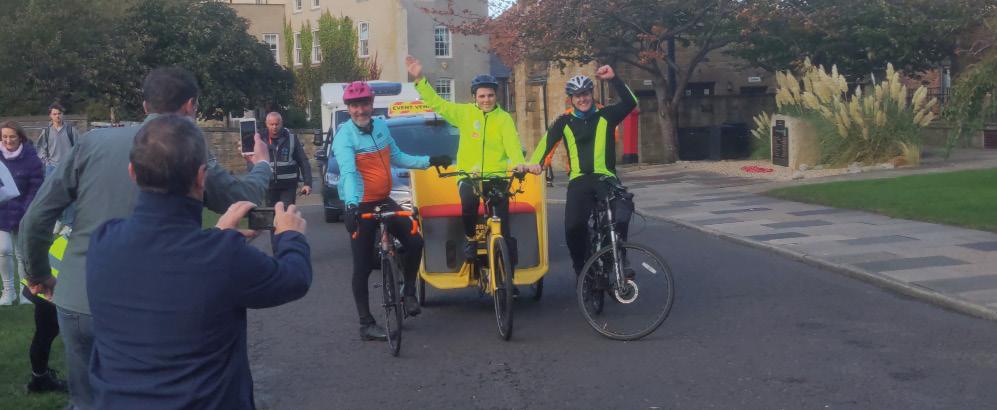 Daniel Hodgson News Editor
Daniel Hodgson News Editor
On Monday 17th October, the One Show’s Ma Baker was in Durham on Day One of his 12th Rickshaw Relay for the annual BBC fundraiser Children in Need, rounding off almost eight hours on the road in front of the Cathedral.
For this first leg of the journey from Sunderland to Durham, he was accompanied by Sunderland native and 16-year-old Alexander Walker, who has benefi ed from Children in Need supporting two local charities: The Foundation of Light and Grace House, following his diagnosis with autism at age two.
He rode the rickshaw through the cobblestone streets of the city centre, having to wait for the Silver Street traffic lights before he could put in one last effort to get up Saddler Street prior to being met by the cheering crowds on Palace Green.
After reaching Durham, Walker said: “It has been absolutely amazing. My favourite part has been that people have given up their time to come and watch me, and support us on the ride.
“It is a dream come true - and even a small amount of money can make a big difference to someone.
The Rickshaw Relay is very
important to me.”
Baker spoke of the joy of being able to take part in a tradition like this year on year:
“It stands for everything that Children in Need is about. Give these kids a chance, give them a bit of support, and watch them fly - and Alexander has done that in spades today.
“It’s my twelfth year of the rickshaw challenge, but I think


you can sense what keeps bringing me back. As we came up Durham streets, the number of people out on the street supporting us was incredible. It’s really emotional for me.
“All of our riders have had their lives changed by the generosity of the people who donate - the Rickshaw Relay shows what good it can do, as those who were children in need are now adults with a future.
“My role is to help them tell their stories - it started with me riding the rickshaw from Edinburgh down to London, but I knew there was so much more to the relay than just people off the telly.”
Chief Executive of Grace House Victoria Brown spoke told Palatinate, saying: “Alexander a ends one of our youth groups… we wanted to come and see him at the finish line… It’s very windy

apparently.”
When asked about what the sessions entail, Brown said: “He comes along, they play pool, next week they’re going down to the beach and they are going out on a canoe, they have other friends…they do cooking lessons, make flapjacks.”
The BBC cameras following Baker and Walker were filming a documentary set to air as part of the campaign on 15th November.
Durham students protest following beating of pro-democracy activist in Manchester
Nina Bu erfield News Reporter
Members of student group Durham Stands with Hong Kong (DSWHK) hosted an assembly in Market Square last Sunday (23rd October), to raise awareness and express the group’s discontent over the treatment of Hong Kong people during a separate protest in Manchester on the 16th October.
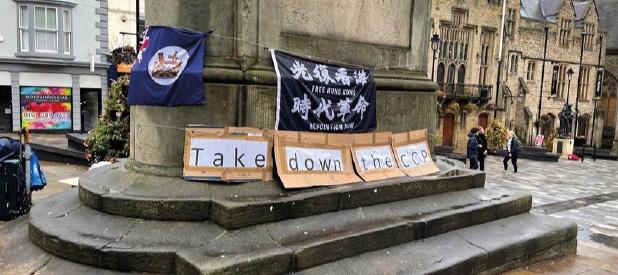
The student-run political organization, who are dedicated to bringing a ention to Hong Kong related issues relevant to the Durham community, hung banners and distributed flyers at the event in Market Square. They encouraged people to get involved in the campaign by emailing the local MP for City of Durham, Mary Foy.
The flyers provided a template le er for supporters which aimed to simplify the process of contacting their MP, as well as information about the current issues facing Hong Kong. This was in service of the primary goal of the assembly which was described by Dominic K, a member of DSWHK, as “to voice our opinion, which our people in Hong Kong cannot.”
The specific event which
DSWHK was responding to occurred a week prior, when Bob Chan, a man from Hong Kong, was assaulted by Chinese diplomats on the grounds of the Chinese consulate in Manchester. He was one of around 40 people - primarily members of Manchester’s Hong Kong diaspora - who protested in front of the Chinese consulate in response to the 20th congress of the Chinese Communist Party (CCP), as they anticipated the extension of President Xi Jinping’s time in office by another five years.
This prediction proved to be correct, as on the same day of the DSWHK’s assembly on Sunday, it was announced that Xi would fulfil a third term in office. This news
was not taken kindly by members of DSWHK who told Palatinate that “we cannot tolerate these kinds of dictatorships.”

The protestors at the consulate in Manchester had brought satirical banners of Xi which apparently insulted consular staff, who then a empted to pull down the banners. Chan tried to stop them from doing so, but he was allegedly dragged into the grounds of the consulate, where he described his hair being ripped from his scalp and being kicked in
the abdomen repeatedly. Images also show blood and bruises below his eyes.
Shortly thereafter, police intervened and retrieved Chan, despite the fact that police are not supposed to enter consulate grounds without permission. The assault has been widely condemned by members of the UK government, many of which are calling for a full apology, and expressed full animosity towards the violation of the UK’s democratic values.
This perspective is shared by DSWHK, with Dominic K saying that the incident was “evidence that the Chinese CCP doesn’t respect — or disregards — the rule of law in the UK”. He went on to say that “you can't drag people in your ground, and onto your territory without facing any consequences.”
He also warned that “the overseas arm of the Chinese CCP is everywhere in the world, especially in the UK,,” requiring a strong response from the government.
As of now, the DSWHK’s primary course of action is mobilizing the Durham community to apply pressure on local MP Mary Foy, with the expectation that she will represent their interests in Parliament.
6 Thursday 27th October 2022 | PALATINATE News
Crowds welcome the Walker and Baker as the Children In Need rickshaw arrived at Palace Green in Durham City (Daniel Hodgson)
Voice our opinion, which our people in Hong Kong cannot
A banner is laid out in Market Square as part of the assembly led by DSWHK (Nina Bu erfield)
EU-domiciled applicant numbers fall by over a third
Frank Kelly Investigations Editor
Applications from EU-domiciled students to Durham University have dropped significantly over the last five years, a Freedom of Information request has found.
The number of applications from EU-based students has dropped by 37% and 39% for undergraduate and postgraduate students respectively. This is despite the fact the number of applications to Durham overall have increased by 14% over the last five years.
Since 1st August 2021, students domiciled in the EU or EEA have been required to pay international student fees, rather than the home fee status which EU-domiciled students were entitled to whilst the UK was a member of the EU.
Applicants also now have to apply for a student visa to study in the UK, which currently costs £363 to apply for from outside the UK. There is an additional annual surcharge of £624 for healthcare, and students may also have to apply for a Graduate Visa after completing a bachelor’s degree to remain in the UK - this visa lasts two years and costs £715.
Prior to the UK’s departure from the EU, the EU Se lement Scheme allowed EU-based students to continue working in the UK after their bachelor’s degree without applying for a visa, and gave them free access to NHS healthcare, but students arriving after January 2021 are not eligible for this scheme.
One student told Palatinate that he thinks the significant decrease has been a consequence of Brexit: “I honestly think Brexit was the only reason why there are fewer European students… Now we regularly need to renew our visas, which has a cost, and a company has to be willing to sponsor us.”
Another student who spoke to Palatinate also believes the drop in EU applicants has been affected by the UK’s decision to leave the EU, because of “the relatively hostile a itude towards EU/international students, and the unreliability that
a UK degree will be recognised by EU employers, and the uncertainty around the possibility of having the right to work in the UK after graduating.
Relatively hostile a itude towards EU/International students
In a statement, a Durham University spokesperson said on the issue of EU applicants: “Durham University is a world-leading and increasingly global university, regularly ranked among the world’s top 100 universities and among the most international.
“We have around 120 countries represented among our staff and students and are working towards our target of reaching 39% international students by 2027. We continue to welcome students from EU countries, as from many other countries across the globe, and enjoy close partnerships with universities in the EU and elsewhere.”
Durham made almost £2million annually through vacation trading before pandemic
Waseem Mohamed News Editor

Durham University made almost £2million in revenue per year through trading during the University’s vacation periods before the Covid-19 pandemic, a Freedom of Information request has found.
The University offers a range of venues - such as college bedrooms and meeting rooms - for hire through its Event Durham service. External agencies are able to book with the service to utilise these facilities throughout the year, including using college bedrooms for accommodation during residential conferences and the use of dining halls for formal banquets.
Palatinate has found that the University made £1.91million in revenue through trading in the 2017/18 academic year, and made a further £1.87million in revenue during the 2018/19 academic year.
However, the Covid-19 pandemic severely dampened the revenues the University could make through trading, as overnight stays and large inperson gatherings were restricted. During the 2019/20 academic year, the University only made £0.13million in revenue, which only increased to £0.31million in the 2020/21 academic year.
From the Archives
In April 1981, Palatinate reported potential Rent Strikes should the rise of the Maintenance Fee be a higher percentage than that of the grant.
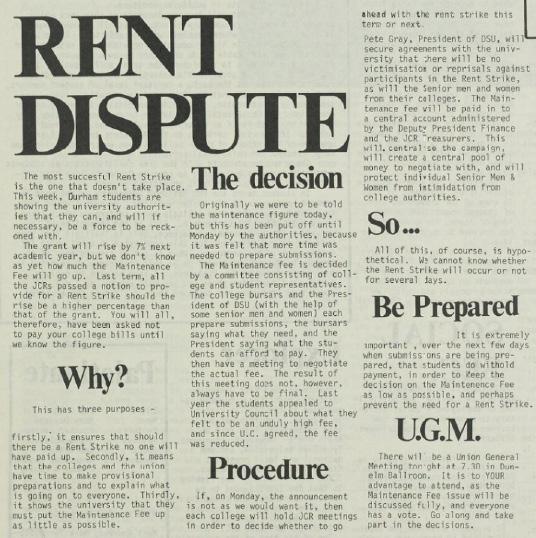
Their reasoning for the strike was: firstly, noone will have paid up. Secondly, it makes that the ‘college and the union have time to make provisional preparations.’ Thirdly, ‘show the University they must put the Maintenance Fee up as li le as possible.’
The DSU President at the time promised to secure ‘agreements with the university that there will be no victimisation or reprisals aginst participants in the Rent Strike’
The paper reports that there will be a Union General Meeting that night at 7:30 in Dunelm Ballroom.

They reported ‘it is to YOUR advantage to a end, as the Maintenance Fee issue will be discussed fully, and everyone has a vote.’

As part of Event Durham’s offering, college bedrooms are often offered to external agencies to use as accommodation during conferences, which means that students living in these rooms are required to temporarily vacate their rooms over the Christmas and/or Easter vacations.
Students are required to completely empty their bedrooms of all belongings, and either use under-bed storage to store less valuable items, or take most of their belongings home during the vacation. Colleges that require students to do this include Collingwood, Grey and Castle, although rooms have also been used at Hatfield, St Aidan’s and St Hild and Bede Colleges in the past.
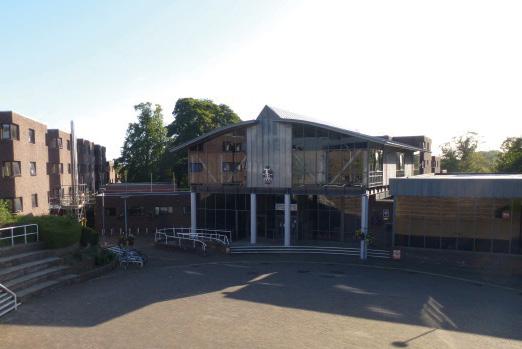
Students living in these bedrooms are often put on shortlet contracts, and are offered a discount for the use of their room during the holidays. The current rebate figure is not publicly available from Durham University, but In the 2020/21 academic year, the discount was shown to be set at £263 per vacation. This is the equivalent of the cost of less than two weeks rent for living in college, despite University vacations lasting 4-5 weeks.
Reacting to Palatinate’s findings, Durham Students’ Union officer Jack Ballingham said: “Sadly this is another example of the University raking in enormous revenues, while maintaining a system of accommodation provision that is fundamentally exclusive.





“While it is understandable for the University to utilise its empty spaces during breaks in this way, like many of the University’s activities, its revenues could be far be er used to make accommodation more affordable for students, rather than fuelling continuous and unnecessary expansion.”
Durham University elected not to offer comment for this article.

7PALATINATE | Thursday 27th October 2022 News
I honestly think Brexit was the only reason why there are fewer European students
Collingwood College (DS Pugh via Wikimedia Commons)
Revenues could be far be er used to make accommodation more affordable for students, rather than fuelling continous expansion
Durham Students VS. The Cost of Living Crisis

Sascha LO
Electricity bills are at a record high, inflation is at 9% and entry to Klute now costs £17. Durham students are being faced with a cost of living crisis so severe that they can no longer afford their weekly shop of Boursin and salmon fillets. As a result, many students have been forced to ask their parents for an increase of their £500 a month allowance. This required them to make their first call home of the term and listen to their mum talk about the family cockapoo for twenty minutes. A worthy sacrifice.
However, students (whose parents do not work in consulting) have been tasked with trying to find part time jobs. Worryingly, it has since been discovered that being head stylist for a college fashion show is not a paid position. Furthermore,
The Viaduct: not so cool now is it?
Caleb Tutt
“She came from Surrey, she had a thirst for knowledge, She studied psychology at Hatfield College”. No, those aren’t the opening lyrics to ‘Common People’ by Pulp but they may as well be. And you can bet a pesto-pasta diet that this archetypal Durham student will, with excitement and naiveté, be living in the viaduct at some point in their university life. This dense neighbourhood, with it’s “grimy aesthetic” and totally studentified housing is inexplicably irresistible to students moving out of college and
despite unionising, the only reimbursement for fashion show models is still only in a banging instagram post and ‘clout’.
not a legitimate profession. Even those following more traditional routes have failed to personally profit from being treasurer of the Consultancy Society.
Those who have discovered that their society-based jobs do not, in fact, pay (or offer any linear career progression) have been forced to cut costs. For example, some remarkable students have decided that, instead of spending money on drinks and club tickets, they will drink a half pint of sourz at home and then go to Jimmy’s. In addition, many have decided to cut down to only one ball a term (to Caledonian Society’s great dismay).
‘took the bus to Aldi rather than joining their house Ocado order’. These scenes are near-apocalyptic. The day that head stylist is not considered a respected position is a sad day for us all.



A le er from... A second year to the freshers
Ollie McKenna
Dear Mr/Ms Fresher,
To put it quite bluntly, I have been rather disappointed by your overall contributions to university life so far.
As a result, many have begun to search within the hospitality sector. Yet similar roadblocks have emerged when it was revealed that being social sec of DU Rugby C team is
into the “real world”. The viaduct is gentrification incarnate only without the nice housing or artisan bakeries, but Afghan coats and boarding school boys clubs. It is its own guerrilla marketing campaign. The hype exists, but why?.
I remember my first term in the viaduct. The excitement wore off within the first two weeks when appendicitis le me bedbound in a house that had both awful mould and a non-functioning boiler. What else could I expect from the charming property empire of one of Durham's premier estate agents. I’d sold my soul away in the contract and I was now at their mercy.
North road Tesco looked like it had been raided in a pre-apocalypse panic so
The most shocking money-saving technique in Durham was witnessed by a second year from St Mary’s college. She claimed that one of her housemates
no paracetamol could help my already dire condition. Going all the way to boots or God forbid the GP was like an expedition to Mordor.
The viaduct is gentrification incarnate only without the
nice housing or artisan bakeries
doorstep. Yay. With the Durham housing crisis now looking like a scene out of “The Big Short”, can one really justify paying Park Lane prices for a Hawthorn Terrace shoebox?. Sure, it was “fun” in second year to live there, but all I have le from my viaduct days is 20% of my original deposit and chronic liver damage. Whilst proving better than the punitive sentence that is Gilesgate, I’d argue many places beat the viaduct. Even HMP Durham is closer to the library, and at least they have a legal obligation to keep the place warm.
I would like to reference two case studies. The first case in question, the infamous Grey College Darts Club (GCDC), a club with a decorated history of success as well as some very accurate ‘dartists’. I was informed by the GCDC president that the intake of freshers has so far been…one. Do tell me, how can a successful darts team be run without a flourishing crop of freshmen to be cultivated? In summary, it can’t. This is reflected in possibly one of the most shocking headlines of the incumbent academic year, “JOBO E team shock GCDC A team 7-1”. An indefensible result, which must be blamed on these lethargic level one students.

9am attendance is foreign to me
Secondly, I would like to cite a Frep - whose identity shall remain anonymous – who admi ed to me that his group of younglings, were just, plain, boring. They don’t drink, they don’t go out, they don’t have fun.
Walks to lectures were long, walks to college or MC were longer, but I suppose at least Babylon was on the
So just remember when you’re on the 40 minute walk back from MC on a dark wet Monday evening and you reach the foot of Mount Crossgate, how cool do you feel now?
Tips n Tricks: how to make your room vibesy
Joe Gellman
Do you have no clue on how to make your newfound college accommodation as vibesy as can be? Well fret no further. All you need as your room's focal point is a:



Fax Machine
If I have learnt anything from my years at Durham, it is that retro is the future. From record players to disposable cameras, relics of the past are becoming increasingly savvy. The key is to be ahead of the game though and try to predict the next craze before it becomes a fad. As such, I would strongly recommend purchasing a nice old fax machine before it is the commonly done thing. You will thank me later.
So, what exactly do they do? This Frep confessed to me that he had certain members of his entourage shifting swiftly across campus to their 9am lectures. I’m not advocating that students shouldn’t a end their lectures, not explicitly anyway, but isn’t the precise purpose of Level One to ease you gently into the course, while you consume an abundance of alcoholic beverages midweek. Perhaps I’m mistaken, if so, I’m extremely lucky to call myself a second-year student. I do jest; I understand that university life can be stressful, but 9am a endance is an entity that is still foreign to me.
Perhaps there is an implicit truth, a structural unevenness; these freshers might argue that their growth has been somewhat stunted by that spiky ball coined SARS-CoV-2. I do lend some sympathy, just a tad. I was schooled in the pandemic, and I turned out just fine…I think.
Yours sincerely, An avid darts fan/alcohol consumer.
Satire
Many students have been forced to ask their parents for an increase of their £500 monthly allowance
8 Thursday 27th October 2022 | PALATINATE Satire Editors: Sascha LO & Rory Cronin For more, visit www.palatinate.org.uk/category/satire
Cartoon ofthe week: Tory House of Cards
(Molly Mihell)
Rosie Bromiley
Durham waves its flimsy flag of support for cost of living crisis
 Dherran Titherington-Bragg
Dherran Titherington-Bragg
Inan email circulated to all students on 10th October, the university set out its various strategies of support, in the midst of the cost-of-living crisis. The degree to which this advice was truly useful, is up for debate.
First, let’s talk about what the email did right. I’d argue the notion of a breakfast club does kind of work. The university is an education body, thus, should be encouraging equal opportunity for its students, despite certain personal factors interfering with necessities, such as nutrition. Enabling a breakfast club for all, before the day begins, whilst minor, does entail an a empt to level the playing field for its student body. It is cheap, really quite simple to arrange, and effective for those that need it.

E-books. Again, a useful area for the university to shine the spotlight. The library service is undoubtably good. Not perfect, but adequate and constantly updating its services to hold more and more texts relevant to each subject. I think the use of eBooks ought to be emphasised, especially to those who are of the impression that physical copies of books are required. One could
surmise the university was justified in mentioning this topic in relation to the current cost-of-living crisis, where non-essentials such as textbooks are likely to be the first to go, further perpetuating the divide for working class students to excel at higher education intuitions.
simply not having a job and then moaning about the cost of living, and then struggling to make ends meet with the hours you do work, whilst balancing a fulltime degree and extra-curriculars. Those students who work will understand the frustration of trying to engage in university life, such as societies and enrichment courses, but not ge ing ample time away from part time work to do so.
So, the remark to find a job, I take issue with. Predominately, due to the fact that this information is not remotely helpful for the many students who couldn’t a end university without one.

what benefits a student is entitled to.
standard as their peers.
The email then went on to outline the student employment service, where one may seek part-time work. Any working-class student will be aware of the need to find employment alongside studies, in order to remain financially stable throughout the year. This is just the reality for many. Therefore, I find the notion of simply suggesting that one finds a job, in the midst of a cost-of-living crisis, seems rather illjudged, and somewhat ignorant as a solution.
There is a difference between

That being said, I must admit that the student employment service website is useful in that the hours and nature of the jobs are more flexible in relation to the student’s needs. This is good, and I consider the email should have brought much more a ention to the nature of the work it was trying to represent. The new student money advisor service, led by Louise Burnip is, I feel, a useful tool in teaching students how to help themselves in becoming more efficient with what money they do have, and how they spend it. She can be contacted via email, helping with advice on money, budgeting, bills and accommodation payments, and most importantly,
The Durham Grant is an invaluable asset in regard to the monetary support offered by the university to students, and I consider it was a strong move to mention it heavily in the email sent out. The grant has been a lifeline to many low-income students and continues to contribute a considerate amount towards essential aspects of university life. One could read this as a given, why should low-income students not receive a grant of sorts, which enables them to not have to work so many hours to stay afloat? A grant which enables students to engage in societies, a tickets for such events, purchase memberships and sports a argue that this financial aid, whilst incredibly generous in scope, should not be used as a token for how supportive the university is for poorer students, but rather a standard practise in enabling students from all backgrounds, who have earned their place at university, the opportunity to excel to the same
The university has some practical resources in place to combat the threats posed by the cost-of-living crisis. I can’t say that I’m convinced it’s enough, nor that one email outlining its few basic strategies is in any way convincing of the genuine desire of the institution to support students for the sake of ensuring equal opportunity, as opposed to merely a empting to avoid the accusation of not caring for students adequately.
(Rosie Bromiley)

How the film industry continues to destroy its actors mental health
torment as they are fla ered publicly for the performance they gave.
Didyou see her in her latest work?" "She'll certainly have a few nominations at the awards shows next year". One of the most accessible forms of entertainment for most of us is watching films, these visual artistic stories which only come together with the cooperation of a huge team of people assigned to different roles to ensure the finished project is a perfect spectacle. At the forefront of this team are the actors who perform for us, they are from whom we are entertained. This entertainment is first evaluated by directors, producers and writers, some of whom can be notoriously cruel. My discussion will look at the treatment of actors on film sets and the toll this can take on their mental health, as well as the expectation to repress this
Shelley Duvall was once a young, hopeful actress who caught the a ention of many casting directors after her early appearances in McCabe and Mrs Miller, and Thieves Like Us, she even went on to host an evening of Saturday Night Live, the signs of a true breakthrough in America. In 1980, she was cast as the female protagonist in Stanley Kubrick's The Shining, adapted from the novel by Stephen King. Recently, a rare photo of Shelley Duvall resurfaced in which she looked almost unrecognisable. Duvall retired from acting 20 years ago and has stayed out of the spotlight ever since, but she has always spoken out about the abuse she suffered on the set of The Shining
During filming, Duvall's character was expected by Kubrick to constantly be in a state of anxiety and fear; her body was constantly in hysterics. To prepare for days of crying on end, Duvall would listen
to heart-breaking songs on her Walkman and relive the saddest memories of her life in her head and while this was torture for her, Kubrick didn't once praise her dedication, in fact he often told other members of the crew to ignore her. His perfectionism would not allow for sincerity. The film is now one of the most critically acclaimed motion pictures of the last century with majority of viewers agreeing that Duvall's performance is so raw and harrowing; Martin Scorsese claims it to be one of his favourite films of all time, yet creative genius behind the story, Stephen King, hates the adaptation and claims Duvall's character, Wendy, has been directed with misogyny interpretation, which is never what he had intended in the book.
Despite the notability and admiration she gained from having been a part of this project, Duvall had been traumatised from the work and did very li le acting
after this, instead moving herself into the production side of the industry. A picture taken of her with a fan just weeks ago is the first that has been seen of her since 2016 in an interview with Dr Phil, in which she opened up about her struggle with mental health, and so the question which remains unanswered is how much help has she received over the years? And did she have to give up the profession she loved for the sake of her own wellbeing?
Bringing us back to the contemporary, the movie currently causing concern amongst viewers is the Netflix original biopic Blonde, starring Ana de Armas as Marilyn Monroe. The film depicts the life of the blonde bombshell, however is based heavily on a book of fiction and much of its contents is not proven to have really happened in Marilyn's life. Including the heavy topics of rape and miscarriage, we just wonder why we cannot just let Marilyn rest in peace. It is known that her treatment in Hollywood
was nothing short of horrendous, and yet sixty years after her death, filmmakers are still feeling the need to expose her. While at face value, the cinematography may be fantastic, does this 'entertainment' (a term I use loosely) justify exposing the what may or may not be fictitious life of a woman who is no longer here to defend herself?
'Christian Bale lived off an apple and cup of coffee a day for months to prepare him for The Machinist', 'Angelina Jolie completely isolated herself from her friends and family to get into character for Gia', 'Marilyn still had to work with her ex-husband Arthur Miller after their divorce'. These are not simply trivia, but trauma to actors. While it is not something we often stop to consider, perhaps we ought to think about the sacrifices made by these stars for their work as if it is entirely mandatory in the profession.
Comment 9PALATINATE | Thursday 27th October 2022
Chloe Hares
A empting to avoid the accusation of not caring for students adequately
NATO, Ukraine, and geopolitics: ignoring the unignorable
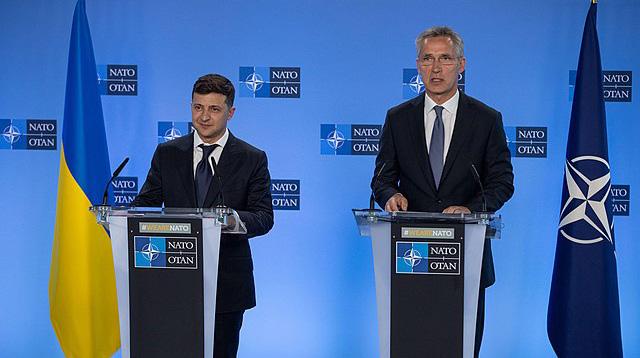 Duru Akin
Duru Akin

It's

been 8 months since the Russia-Ukraine War began, and yet not a single country has supported Ukraine with more impactful sources such as troops. Evidently, countries seem to have a great deal to say, yet are suddenly immobile when it comes to taking action. Perhaps standard consoling statements such as ‘NATO condemns Russia’s illegal a empt to annex four regions of Ukraine’ will only turn into action when NATO finds the war ‘actually’ threatening.
There are numerous reasons as to why countries seem negligent of Ukraine’s situation, which are under the umbrella of NATO. To be more specific, the most prominent factor is that NATO will not interfere with any conflict as long as its members are not involved. Bearing in mind the condemning claims made by NATO and several countries, the answer seems rather obvious: simply accepting Ukraine as a NATO member will do. The reality of the situation, however, is far too complicated.
The RussiaUkraine war is more than a mere fight over land
Geopolitics play a tremendous role in limiting Ukraine’s chances of genuine recognition and support. As Russia possesses significant military power and an intricate relationship with Western countries, it seems rather beneficial to have a protecting ‘barrier’ in between; in other words, Ukraine serves as a ‘fence’ which
strategically separates Western countries from Russia. It would be awfully nonsensical to try and add Ukraine to NATO. Moreover, a empting to make such a move whilst Russia a empts to ‘regain its rightful territories’ and strengthen CSTO would result in jeopardizing relations, which are already delicate to begin with.
According to the proposed political atmosphere, it is obvious what to expect from NATO and countries’ regarding the war and its progression. While Ukraine struggles to single-handedly fight off the war, the rest of the world will continue commenting on the atrocity of the situation and refuse to do any more. Doing so, those countries who wish to stay out of Russia’s way will ignore the unignorable while appearing to be sincere.
It is ironic how Western countries and alliances turn the other way when their incorporation is needed, as the Russia-Ukraine war is more than a mere fight over land – this war is Russia’s bold announcement to Western countries of the power and persistence it possesses. In a way challenging the West, Russia is exhibiting an effort to display its excellence. In an a empt to assert dominance, the world witnesses the unfair struggle of Ukraine.
So what is it that we see countries are doing at the sight of what is a futile conflict? Apart from the consoling statements mentioned earlier, it seems that the war is an execellent excuse to explain the ongoing economic decline and basically anything else that is 'blamable.' It is true that we are in a global recession, however the war itself cannot be the only factor for such a drastic downfall as most European countries have been established on riches accumulated throughout hundreds of years. In ligth of this, it is pointless to make any remarks about how 'intolerable' the situation is. At the end, everything ties up to geopolitics and self-interest.
Online exams should stay
 Holly Downes
Holly Downes

Forany student reading this right now, I am sure you know what it feels like to sit an in-person exam. Of the late nights spent memorising every single word in your textbook until your brain reaches breaking point. Of waking up with a feeling of nausea as you count down the looming hours to the exam – a paper which, in that moment, feels like life or death. Of walking into the exam hall, gripping your singular pen and clear water bo le, and spo ing the piles of papers which seem to bear the key to a successful future. And at last, the moment comes – you are told to open the paper and frantically pour your brain onto the pages.
The last time I had this experience was at Christmas in 2019 – a mighty three years ago. A time when the last pandemic was the Swine Flu and online exams were something that I didn’t even think were possible. It was my mock A-level exams, which at that point, I didn’t know would be my last. Becoming the year that escaped the daunting exams and had one-and-a-half years of sixth form education basically thrown down the drain, I haven’t taken an in-person exam since, and never really thought I’d have to again.
Yet, with the current decision of the format of my third-year exams remaining undecided, I fear that my final and most important year will be one marked by sheer anxiety. The thought of suddenly ge ing thrown into multiple in-person exams after years of becoming accustomed to online learning is daunting to say the least. Being a humanities student, my course doesn’t teach me how to write multiple essays within an hour, but rather encourages me to spend time thinking, reading, and
writing. Yet, with memorisation being the secret to ge ing a good grade, I fear that my cohort won’t be able to deal with the pressure of resisting what we have been taught for the past two years.
With my first- and second-year exams being online, where I had a rather generous 24 hours to complete each paper, the trauma that goes into preparing for and taking an in-person exam was something that I could gratefully skip. I could simply crawl out of bed, be surrounded by my notes, and could take as many breaks as my heart desired. I could spend time ensuring my arguments actually made sense and not have to worry about whether the examiner would be able to read my writing. I had time to think and not simply regurgitate what I could memorise the night before.
With humanities degrees
have time to come up with thoughtful ideas, but rather trust that you're writing words that make sense.




Although I can only speak for the humanities students, online exams not only align with what my lecturers preach, but just make sense in a world that is more environmentally conscious and forever striving to save both time and money.
Pen-and-paper exams not only require tons of printed answer sheets, which is wasteful in itself, but the carbon footprint in transporting these papers to and from exam locations adds up. And these necessities all cost money, that although the university can undoubtably afford, seems wasteful when there is an easier and cheaper way of assessing students.
And from what I’ve gathered, there seems to be a consensus that online exams are the preferred format.




stressing the importance of developing reflective points, becoming memorisation machines for the exams next year is a mere contradiction. Memorising quotes and concepts defeat the whole purpose of my degree – one which is founded on deep thought, precise language, and long hours of reading and writing. Thoughtful essays cannot be wri en in an hour. They require research, continuous rewording, and re-reading –practices that in-person exams promote the opposite of. Rather, it becomes a challenge of how much you can write in an hour. You don’t
The majority of students want the continuation of the online exam – not only for its convenience, but because it makes sense in a society that is becoming increasingly digitalised. The university has the technology to release thousands of papers at their scheduled time that it would only be a poor business choice to reintroduce the oldfashioned in-person exam.
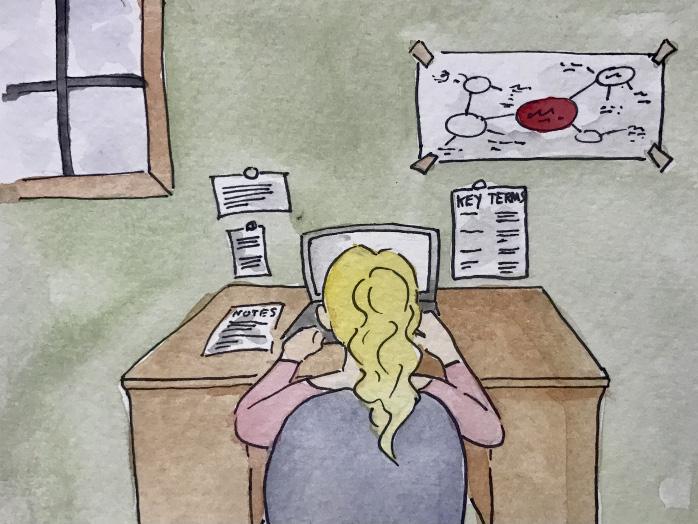
We are undoubtedly entering a new era of examinations and Durham needs to catch up.
The outdated in-person format that will most likely generate the lowest grades on record for humanities, or the online exam, which has proven successful over the past two years, where students can get the grades they deserve? I guess it all boils down to what our university prioritises – the old, rigid style of examination or a consideration of a postpandemic generation. I guess we just have to wait and see.
10 Thursday 27th October 2022 | PALATINATE Comment
(Rosie Bromiley)
We are undoubtedly entering a new era of examinations and Durham needs to catch up
(President of Ukraine via Wikimedia Commons)
(Victoria Cheng)
£122 mill employment boost for mental health support: caring or missing the mark?






Ellie Dyer-Brown


Itis telling that in the Government’s press release regarding its £122 million employment boost for people receiving mental health support, the plan is repeatedly described as a way to “grow the economy”. The benefits of this investment for the people it is aimed at are li le more than an afterthought; it will “fuel a thriving labour market” and “increase individual prosperity”. However, we don’t learn that returning to work could help people with mental health issues until the third paragraph and not at all in the summarising bullet points.
It is difficult to read the press release without feeling uncomfortable. Not because the idea itself is bad — it is well-known that working can provide stability, routine and a sense of purpose — but because the language used to justify the investment comes across as exploitative. People being out of work has economic implications, of course, but the Government has turned mental health into a financial problem. The press release essentially says, ‘what’s best for the economy is what’s best for you’, as if unemployed people who suffer from a mental illness are one of the top issues our country faces right now. Our economy is in crisis: from rampant inflation to falling GDP, along with the 6.7 million people on the NHS waiting lists. Suddenly, the drive to get mentally ill people into work seems like a drop in the ocean in the grand scheme of things.
The Government's desire for growth is understandable; although unemployment is the lowest it has been since 1974, the number of people who are long-
term sick and thus out of work is at an all-time high. However, this reflects the Government’s appalling handling of the pandemic. If it hadn’t deliberately sought to frighten people, causing many to develop depression and anxiety, and if the National Health Service hadn’t been in such a precarious position even before Covid-19 hit, then perhaps the issue wouldn’t have been quite so urgent today.
glaringly obvious caveat had been omi ed: the ability of a job to improve mental health is contingent on the conditions, culture and support systems in the workplace. A 2022 poll by Nuffield Health revealed that twothirds of employees wouldn’t feel comfortable discussing mental health with their employer, showing the culture within an organisation can harm just as easily as it can help, and the impact of this can be tenfold for people with mental health issues.
The NHS needs you! (Specifically your blood)
The NHS has been crying out for blood donors for years, and even though the circumstances prompting this rallying effort are desperate, the end result is still welcome.
In August, 1.2 million people were waiting for mental health support, and a combination of underfunding and high demand has resulted in the NHS missing several of its major targets. If this were really about mental health, why not invest the money in improving existing services to cut waiting lists? Or be er yet, encourage more people to train as mental health professionals and create jobs for them.
It’s all very well telling people to get back to work, but there is a fine line between a supportive nudge and a shove, and the Government already overstepped it during the pandemic. This cannot be allowed to happen again at the expense of people’s mental well-being.

Reading through the press release, it struck me that one
The Government’s approach reminds me of when my mum marched me to the doctor, at a loss for what else she could do when I was fourteen and underweight. The upshot of the appointment? You should try to eat a bit more. In theory, this was exactly the right solution; if I ate more food, I would put on weight. But there was something in my mind stopping me from doing so, and until that was fixed, the obvious solution was never going to work. Likewise, encouraging people with mental health issues to return to employment too soon might boost the economy temporarily but it won’t fix the problem in the long term if there is no support available in the workplace.
To achieve its goal in an effective and compassionate way, the Government must ensure two things. First, that it doesn’t place pressure on employment advisers to get a certain number of people into work, and second, that it also encourages more businesses to fulfil their duty of care by supporting mental health in the workplace. This way, advice can be offered on a case-by-case basis, and people can return to employment with confidence. Mental health isn’t something that can be fixed with a single lifestyle change; for many, it is a long and difficult ba le, and Government interventions need to reflect this.
Blood donation is the driving force of the NHS. Without the generosity of volunteers from all corners of British society, operations requiring blood products would not go ahead and people needing urgent blood transfusions may face further health complications, or even (preventable) death. This dystopian vision was sharpened in the British consciousness this week, as the NHS released an Amber Alert on blood supplies – meaning the store of blood products was running at half its required capacity. Levels of O-type blood, used more frequently in operations due to their universality, only had two days worth of national supply left. An ‘Amber Alert’ is only issued by the NHS when blood supplies are low enough to require preservation for the most severe cases and as such there is widespread concern for the cancellation of elective surgeries. This, coupled with the ever-growing NHS waiting list for surgeries, is deeply worrying.
However, it would be misleading to report this story only as a shortage of blood donors. Numbers have been down for a number of years, so why is the NHS blood donation service at a crisis point now?
The NHS Blood Transplant service cite staff shortages and illness as severely limiting the number of appointments available, alongside a wider pa ern of avoidance behaviour away from towns and cities (due to fears of Covid transmission).
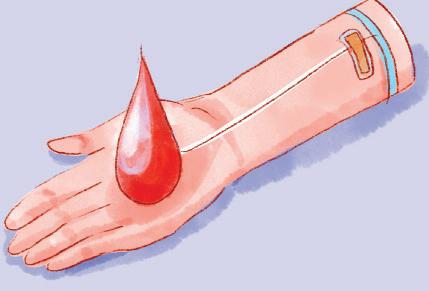
As such, there are supply-side issues within the system which have also exacerbated this crisis moment of blood shortage. A tive recruitment is underway to fill vacancies to have more donation appointments available in more convenient locations across the country. Recruitment is of course a nationwide issue for the NHS, and it is certainly not an issue that will be solved overnight.
The shortage of blood products is another setback for the new Health Secretary’s efforts to reduce NHS surgery waiting lists, as hospitals will have to decide which surgeries will have to be cancelled, to preserve blood supply for emergency surgeries and cancer treatments. Hospitals should not be put in the position of allocating blood supplies on the basis of how ‘sick’ a patient is. This is clearly an impossible choice.
It is important to note from the outset that not all cultures and religions condone the donation of blood products, a notable example being the Jehovah’s Witnesses denomination of Christianity, and of course they have the right to refuse blood in hospital. However, for the majority of people, blood donation is a system we do not often actively consider a necessary product we expect to receive freely in our hour of need. Therefore, when this medical security is under threat, as a nation we need to sit up and listen – and act.
The response to this news story has been staggeringly positive. 7,500 people have registered as new blood donors – a rise unmatched in the past 20 years. People want to help, ‘do their bit’ for their fellow citizens in need of these blood products – this is admirable and quite frankly heart-warming.
So, to anyone considering becoming a blood donor, I applaud you for contemplating that decision in the first place and implore you to take the plunge and book that first appointment. Your NHS needs you; we all need you. An added feature of the blood donation system tells you which hospital your blood has been used in – a nice touch for donors to feel connected to the fellow citizens they feel morally obligated to help. Blood donation brings us all closer together, more morally responsible for the health of one another. If you feel able, book a donation appointment, and know that you’re not only helping the three people receiving your blood, but helping the NHS run a li le be er too. For all of us.
11 Comment
Hannah Redman
PALATINATE | Thursday 27th October 2022
The language used to justify the investment comes across as exploitative
Levels of O-type blood, used more frequently in operations due to the universality, only had two days worth of national supply left The NHS needs you; we all need you
Profile

Benjamin Zephaniah: “I can make people think and change their minds”
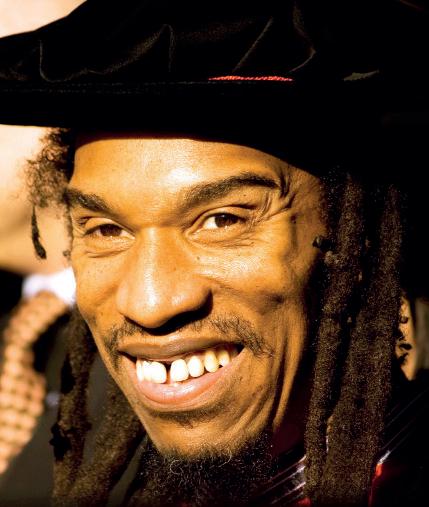
Britain’s favourite dub poet talks racism, anarchy and Peaky Blinders in this exclusive interview to celebrate Black History Month
Arjun Seth Profile Editor
We convene virtually to chat over Zoom on a late Tuesday morning. In typical Zephaniah style, Benjamin is laid-back, smiling and ready to chat. “You’re the first person I’ve spoken to all morning so forgive me for going on,” he laughs.
Zephaniah’s canon is exceptional, and he is widely known for his dub style inspired by reggae and oral tradition. His method of delivery has prompted widespread critical acclaim and won him audiences in places previously untouched by poetry as he goes on to argue. I can begin by asking him what poetry really is and means for him.
misunderstanding the premise of the Miss World contest. Even though I was very young, I wanted to write poetry that changed the world and made people think.
“Part of my a itude is that I can make people think and change their minds and that is why I do my poetry.”
Throughout his career, Zephaniah has been hailed for his unique talent to reach people in their living rooms and community centres who have never previously had contact with poetry before.
“When I published Pen Ribbon in 1981 and people were talking about me on the television, I would get congratulated by people in the street who said they didn’t even read books! My audience weren’t even readers.



“I realised I wanted to take my poetry onto television and perform in places where people never previously would perform – community centres, pool halls, barber shops. I wanted to take poetry to people. I would appear delivering a poem during the new Channel 4’s commercial breaks.
I wanted to bring poetry into the living rooms, sports halls, community centres.”
politics, in which Zephaniah is a self-identified anarchist. “What we’re seeing today illustrates to me how democracy and the status quo can be manipulated in a way that superficially seems like it works for you when it does not represent you.”
“Poetry is simply taking everyday words that we use and arranging them in a way that touches people. You do have poets who want to show off their education and use big words but that’s not my school of poetry. I may use words that come from the street of Jamaican Patois. I remember writing a poem and using the old-English term word ‘pelf’ which means to hoard money - I have to confess, I found it in the dictionary! For me, poetry is about taking words that people recognise and arranging them in a way that is beautiful or can be recognised.”
Zephaniah then turns to himself and out loud asks “Why do I write my poetry?”
“For my love of words. It was not until I realised some of the negative things in the world that my poetry became a bit more serious. I first started writing around the time of the Biafra War when I was appalled by the subsequent racism black kids faced. I remember
Zephaniah notes that his urge for writing stemmed from what he grew up experiencing. “As a person of colour, dealing with racism was an urgent priority. You could not get away from it. I remember being told my mother to always go out with my brother. We had to always think about how you were ge ing home. You couldn’t rely on police because they would beat you up! That is why our poetry was so political. We weren’t academic politics students; we were people being beaten up! My poetry wanted to address this as it was urgent.”
As a learned figure whose been on the performing circuit for over 40 years and having seen immense societal change from the 1981 Race Riots to the celebration of Black History Month today I ask Zephaniah how society has evolved.
“It’s a mixed bag. I used to say that I was sick of seeing only white faces behind a camera and that has definitely changed. We’ve made lots of progress there.”
He highlights how he remembers being one of the first black-British poets. Recalling the hit Talking Turkeys, Zephaniah’s poem which is now staple of every primary school’s poetry lesson, he notes “that is progress.”
Inevitably, we then move onto
“I knew more than half of Blair’s first Cabinet and likewise for Mandela’s. Most of them were from London and Islington.
“His first minister for Culture was my best friend, we all used to hang out,” he adds so casually.
“Dali Tambo’s father used to organise my gigs. I saw them all go back [to South Africa] and become corrupted. People can write about anarchist theories as much they like but there are places that live without government and live peacefully and happily. A lack of power means people of course aren’t fighting over it and the main objective of society is to look after each other”. He says simply with a smile.
Zephaniah is keen to reject the cliché that he gave ‘a voice to a generation.’
“I don’t really think that’s true. I was one of the voices who was in the mix of shouting about what was wrong at the time. That was it really,” he says in a very ma er of fact way.
“Although I was a protest poet, it was not just about the protest, there was some humanity. I could laugh as well hence the humour in my work. Many poets fell away after Mandela came out of prison and Thatcher went. They had nothing else to write about so disappeared. I began doing children’s poetry.
“I’ve never compromised my political views, but I’ve never insulted other people’s views. As Tony Benn taught me, you a ack the policies, but you don’t a ack the
person – one of the greatest things I’ve been taught.”



Keen to leave a parting note of advice for myself and all students, Zephaniah adds:
“People love honesty. I’ve been in trouble in the past, but I’ve been very open about it. I’ve always volunteered the information in fact! People are surprised but if you want to know about me, the real me, then you have to know the truth. In a very strange way, people like that honesty. Even if they disagree you, they think at least you’re being true to yourself.”
“Try not to follow trends –especially when writing. The trend may very quickly become unfashionable and then you are left defending it. If you have been true to yourself then at least you can own your actions and say it was your belief at the time.”
We wrap up our conversation by of course discussing Peaky Blinders in which Zephaniah stars as a mad preacher.
“I had to do it, I’m from Handsworth! My character is based on a real figure who was a Jamaican preacher living in Birmingham and became a slightly off-his-head preacher who was preaching hell and damnation for fornicaters. It was almost as if the part was wri en for me.”
With a look at the watch he says, “I’ve got to go and check on my sweet potatoes in my patch!”
12 Thursday 27th October 2022 | PALATINATE
I would get congratulated by people in the street who said they didn’t even read books!
You a ack the policies but you don’t a ack the person
Benjamin Zephaniah (David Morris via Wikimedia Commons)
I knew more than half of Blair’s first Cabinet and likewise for Mandela’s. Most of them were from London and Islington
More Fiya: a modern poetic force to be reckoned with

the event, I was able to gather some brief thoughts. I got my hands on a copy of the anthology and it lived up to all expectation. The collection is rich with imagery and cultural references which are often not depicted in mainstream printed literature and poetry.
Christian Vince Profile Editor
Durham book festival highlights incredible literary individuals by giving them a platform to share their works with local crowds. An event that caught my eye was the session with three poets who feature in a new collection of black British poetry: More Fiya. The title and concept is reminiscent of the 1998 anthology titled: The Fire People. Both collections of poetry celebrate the work of black individuals who write about a broad spectrum of ideas, from cultural identity to grief.
the art form as a way in which her culture communicates, “in my country, it has a purpose … it’s an act of worship”. Yassin draws upon the relationship between religion and poetry and, as a Muslim woman, the importance of is in connecting with her Islamic roots. Smith furthers this point drawing upon “the king James version of the bible [being] steeped with poetry”. She clarifies that poetry “isn’t necessarily book bound” with it existing in everyday life.
Following this comment, I begin to question whether Yassin or Smith find themselves returning to a particular type of imagery or motif in their poetry which inspires them. Yassin “was doing this a lot when I started but now, I am doing the opposite”. “The reason I started was because I was writing about the people I know, what I know”. This sort of binary writing and structure, I suggest, could often limit people’s desire to write poetry. However, Yassin is now breaking out of this traditional mold and “rediscovering what poetry means” for her.
painting, but it is about “race, about sexuality; a kind of euphemism for queerness”.
Following this brief insight into her process with a poem from the anthology, Smith shares the way in which nature influences her work. This can be seen in the work she produced during her time in the inaugural position of Poetin-Residence for Keats’ House in Hampstead.
At this event, three poets read a selection of their poetry and two later spoke with profile about their relationship with this form of self-expression and its continuing importance in modern society. Warda Yassin and Rommi Smith eloquently and, of course, poetically answered my questions.
Following the readings and Q and A, I was interested to hear about how the poets believe poetry has changed over the past hundred years and whether they believe the purpose has changed. Rather wi ily, Smith responds with “well, I wasn’t alive a hundred years ago” but she can visibly continue to see similarities in the “importance of orality” in poetry. Smith goes on to talk about access to this art form becoming easier due to the advancements of “digital systems” with people using “old methods but using new forms. For example, “insta poets, podcasts etc”.
Yassin takes a slightly different perspective on the ma er, answering that many poets back in the time of Wordsworth and Blake saw “poetry as a way of life”. Life has moved on from “romanticism being a lifestyle” and now, “people want different things from their poems”. More personally however, the crux of poetry is the same, with it “meaning something different to each person”. In relation to Yassin’s poetry, in which she discusses
Smith develops this by describing music and art as being huge influences on her bodies of work. Finding inspiration from the “number of painters who I love, Walco being one of them” and “Joni Mitchell” who also bridge many gaps between art, music and poetry. “I am always drawing an image with my poetry”.
She tells a story of how the line: “there is a quality of light I cannot name” came to be after a walk in the Lake District. “I took no pen and paper because I feel like it can do stuff to you” and without this, “I had no way of documenting what I saw”. Upon reaching the hills Smith “kept thinking about how mysterious the light was. There was both light and shadow … it was like a spell”. This line then came to her and, once reaching the bo the mountain, “I went into a café and asked them for a receipt so I could scribble down the line”. Smith soon realised that this line, which subsequently shaped her poem, was laced with a hidden inspiration from Audrey Lorde, an American writer. The line reads: “there is a quality of light through which we scrutinise our lives”. This is a perfect example of “carrying text” through your poetry and keeping alive interesting concepts and feelings.
One of the poems in the anthology is demonstrative of the way in which Smith translate art into lyrical stanzas. The painting, David Oxtoby’s depiction of li le Richard, a racted Smith for it’s looking as if it was “on fire”. “I wanted to capture the energy of the painting and the colours”. Smith compares her poetry to a Farrow & Ball paint chart, as if you are mixing the meticulously named colours within chart. Within this poem in particular, colour goes beyond the mere appearance of the poem and
The final question I pose to the poets is about how young people can find their poetic voice and use this to their advantage. Yassin responds, “it always starts with reading … and through being a reader, I fell in love with writing”. Yassin reveals her dyslexia and how “Wordsworth never really did it for me”. It wasn’t until “I saw women, Somalian women in poetry … it was the first time I’d ever seen my language being in print and it was so, so powerful”.
The key to poetry, according to Yassin is “being authentic” and both hope to promote the art form to a new generation of individuals as a way of self-expression.
Upon the conclusion of the intervew and




During the event itself, the three women were discussing the key issues that face black individuals in poetry. A root of the issue, highlighted by Smith, is the majority of editors being white. This, as she explained, then impacts the way in which certain black experiences are expressed. The editor being a black man, Kayo Chingonyi, is what makes this collection even more authentic and raw and makes for an inspiring

Profile speaks to Warda Yassin and Rommi Smith about their bodies of poetic works, cultural inspiration and their contribution to an anthology of powerful black voices
In my country, [poetry] has a purpose ... it’s an act of worship
Profile 13PALATINATE | Thursday 27th October 2022
I wanted to capture the energy of the paintings and the colours
I wanted to capture the energy of the paintings and the
100 seconds to midnight?
Sco
The world is 100 seconds to midnight. For the last two years, this innocuous sounding phrase has been front and centre in the minds of researchers at The Bulletin of the Atomic Scientists, a magazine created to push the idea of nuclear disarmament. This is the time as measured by the Doomsday Clock. The macabre name is well deserved. A time of 100 seconds to midnight on a regular clock would denote the close of a day. On the Doomsday clock, it purports to show the close of all of humanity’s days. The closer the time gets to midnight, the closer the world comes to self-induced destruction and annihilation. 100 seconds to midnight is the closest the world has ever come to nuclear disaster in the clock’s 75year history which certainly sounds
ominous, but the clock is often misunderstood or misrepresented. A review of the clock’s history is then useful, especially as its time may soon change to reflect recent events in Ukraine.
Firstly, the clock is a metaphor. It is not predicting the end of humanity in the next few years but is instead updating its time based on current events in the world. It should not be seen as a prediction but instead should be viewed as a poignant illustration of the risks facing the world at the point of the time being set.
Viewing the clock as a metaphorical illustration is particularly sensible when we consider its origin. In the 1947 edition of the Bulletin, artist Martyl Langsdorf was commissioned to create its cover. She originally considered using the chemical symbol for uranium but changed
How the Doomsday Clock has changed since 1947
SciTech (Cameron McAllister)
her mind after conversations with her husband and his colleagues – all physicists on the Manha an Project to design nuclear weapons during the Second World War – who had deep concerns about the destructive power of nuclear weapons. From these conversations, Langsdorf opted for a clock to reflect the fact that the world was quickly running out of time to bring the proliferation of nuclear weapons under control. The 1947 edition of Bulletin thus went to print emblazoned with a clock displaying the time as 7 minutes to midnight which Langsdorf justified by how “it looked good to my eye”.
In the following years, the editor of the Bulletin, Eugene Rabinowitch, decided that the time should be moved closer to midnight to reflect the Soviet Union’s rapidly strengthening nuclear arsenal. Until his death in 1973, it was Rabinowitch who decided what time the clock should be set to.
After the Soviet Union tested its first atomic weapon in 1949, the time was set to 3 minutes to midnight.
As the Cold War developed, the clock developed with it. In 1953, the United States and the Soviet Union both tested larger thermonuclear weapons within six months of each other and in turn, the clock was set to two minutes to midnight. The world was quite clearly ge ing
closer to nuclear war with every passing minute.
The Cuban Missile Crisis is largely regarded as the point in human history in which humanity came closest to open nuclear war. Last minute negotiations between US and USSR diplomats narrowly averted a catastrophe.
Confusingly, the clock was moved from 7 minutes to 12 minutes over the period 1960 to 1963. This was done in response to the post-Crisis agreements that installed a direct communication line between Washington and Moscow to prevent rapid, uncontrolled escalations of violence and to the Partial Test Ban Treaty which banned underground nuclear tests. This was the first international agreement commi ing either side of the cold war to some form of disarmament.
Since the Missile Crisis, the clock returned to hovering around 7 minutes during the 70s and then plummeted to 3 minutes as relations between the US and USSR deteriorated in the 80s. Upon the dissolution of the Soviet Union in 1991 and the end of the Cold War, the clock was set to 17 minutes to midnight, the safest it has ever been.
As the millennium ended, it became increasingly clear that anthropogenic
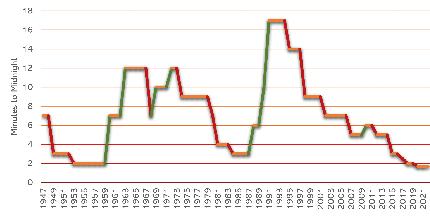

Supercomputer simulations surprise on lunar origin
Leo Li
One might find the birth of the Moon harshly mundane. 4.5 billion years ago, a Mars-sized object impacted the Earth. The remnants of this collision – a disk of unreactive debris – coalesced into the Moon. Granted, the impacting object is given the name Theia, which in Hesiod’s Theogony is the mother of Selene, the goddess of our Moon. But the theory that Moon was, like most star-stuff in our Universe, nothing but a handful of dust displeases some Keplerian aestheticians. Whether it is an act of contention or curiosity, derivatives of and hypotheses other than the giant impact have been gaining favour. Latest simulations from the Institute for Computational Cosmology at Durham University, led by Jacob Kegerreis, Sergio Ruiz-Bonilla, Dr. Vincent Eke, Prof. Richard Massey and Thomas Sandnes, strongly suggest that the Moon had taken the form of a satellite immediately after the impact. The Moon was born an infant of

Mother Gaia, in close semblance to its baby-face roundness today.
It is important to note that these simulations are by no means a empts to disprove the original giant impact hypothesis but to rectify its misses. The original theory holds many merits in explaining: 1) the similar orientations of the Earth’s and the Moon’s spins and 2) the unnatural amount of angular momentum of the Earth-Moon orbit. Scientists favour the outlook of a debris disk forming after the Earth-Theia impact largely because that is what has been observed in other systems.
However, there are also unresolved problems from an unaltered giant impact theory. The mineral content and isotopic compositions of the Moon have at the same time significant deviations from and uncanny similarities with the Earth’s. Hence, to alleviate these tensions, the birth of the Moon was reimagined and rigorously tested through the University’s highresolution simulations.
The study used the Smoothed Particle Hydrodynamics (SPH) method, powered by the highly popular gravity code SWIFT. Around


400 numerical simulations were run, under set conditions dictated by hydrostatic equilibrium and Roche limits. These simulations tested different impact masses,
In other scenarios, the proto-Moon was not launched far enough to pass the Roche limit. Nonetheless, it survived the tidal stripping, which in fact facilitated angular momentum transfer and fine-tuned the protoMoon’s torque to propel it onto a stable orbit. This process involving multistage collisions between stripped materials is highly chaotic, resulting in a large uncertainty and sca er in predicting the resultant orbit. This is however mitigatable by increasing the simulation resolution in the future.
climate change was becoming an equal threat to humanity’s survival and so since 2007, the risk that climate change poses has been considered when the time is set.
The clock is now at 100 seconds to midnight – supposedly the most dangerous situation the world has ever faced – on the back of recent military events in Ukraine, the breakdown of international disarmament treaties like that in Iran, and leader’s propensities to issue veiled nuclear threats. The failure of nations to come to wholeheartedly commit to any form of decarbonisation agreement is also contributing to this bleak outlook.
The Doomsday Clock is simply an a empt by an independent organisation to condense the complicated geopolitical relations into an easily understandable metric that makes it overtly clear that further nuclear proliferation and climatological neglect could have devastating consequences. If its dramatic nature prompts public officials and leaders to make meaningful changes and make us all a li le bit safer, the hard work of

angles and temperature profiles.
Collated results show that the Moon was at first a proto-satellite which avidly received angular momentum from the proto-Earth. As it was aggregating materials it was flung further out into orbit.
After some fluctuations in torque within the system, at around the 35th hour after impact, the Moon became the satellite we are familiar with. This scenario was largely determined by the impact angle, required to be around 45º
This study suggests new parameters, such as Theia’s impact angle, the eccentricity of the Moon’s early orbit and orbital resonances, which are variables to be further researched. The simulation methods can be adapted to similar processes in other planetary systems. Some other variables and constraints future studies need to take into consideration are potential magma oceans, postimpact planets and disks. The successful analysis of the Moon’s
internal structure, notably the iron content, and its formation is a plausible model for future studies on other isotopic compositions. The system’s angular momentum can range from the present-day to higher values, especially as the spin of the proto-Earth is increased.
On surface level, this alternative theory does not seem to revolutionise the original giant impact hypothesis. However, it shakes up the dust that has set on the hypothesis many of us have stopped questioning, and again fixes our eyes onto the deeper mysteries surrounding lunar origin. After all, its many possibilities are what makes the birth of the Moon something truly extraordinary.
14 Thursday 27th October 2022 | PALATINATE
Cameron
The birth of the Moon was reimagined and rigorously tested
(Niranjan via Unsplash)
Data, Sovereignty, and Big Business: a trilemma?
 Paddy Stephens SciTech Editor
Paddy Stephens SciTech Editor
Have you ever wanted to sue the US government? Soon, should you manage to escape from this troubled island across the Channel, you might well be able to. EU users will soon be able to challenge US security agencies for misuse of data of their personal data. That comes from an executive order signed
by President Biden earlier this month, allowing legal challenges to American government surveillance practices against them.
Where has this all come from? The EU is the world leader in privacy protection legislation, and the US is the home of countless global tech companies and national security agencies keen to collect data and surveille people. There is an obvious tension there, even between two friendly jurisdictions
which agree on many shared legal and political principles. Since its first data privacy rules in the late 90s, Brussels has said that information about people in Europe could only be sent to countries where it would be properly protected. After the 2013 Snowdon allegations showed that the security agencies in the Land of the Free were actually pre y keen on surveillance, it became clear that the US did not really fit the EU’s high standards. It turned out that data hosted by US companies could be accessed by the NSA.
Enter Privacy Shield. In 2016, the EU and US signed an agreement to try to fix the issue, giving it the name of a rejected Marvel superpower. It turned out that, as shields go, it was about as bulletproof as a balloon, and the ECJ struck it down in 2020 because US agencies could still access plenty of EU users’ personal data willy-nilly. Biden’s Executive Order is an a empt to give those users a right to redress by creating a new court which can force intelligence agencies breaking the rules in the collection and use of their data to delete it. It also sets out clearly what those rules are. The administration and European Commission are both hoping that the courts will give this one a thumbs-up.
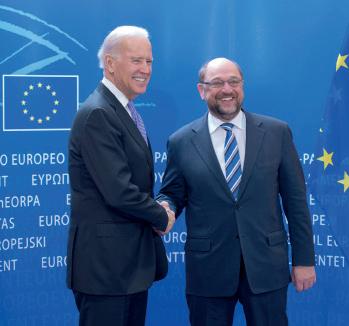
So why does this all ma er? Aside from the obvious benefit of limiting unnecessary surveillance by US agencies, it will calm the tech industry somewhat. The situation has been uncertain for over two years. The underlying question,
they claimed, of whether companies could store data of Europeans on US soil was existential for their business in Europe. Some tech companies claimed they would have to pull out of the continent entirely; assuming the Executive Order satisfies the courts, that prospect now seems to have been ruled out.
Data-sharing is a challenge even between friendly regimes with similar legal systems
of a market of 500 million.

That is not to say that, assuming the Executive Order satisfies the courts, that it’s all sunshine and rainbows for international companies reliant on data flows. Google Analytics has so far been banned in Italy, France and Austria on the grounds that cross-border data transfers via cookies are illegal (you know, the cookies you unthinkingly accept every time you go on a website that allow you to be tracked).
I am sceptical that among the large players this was ever a serious possibility. Take Meta: in July, the Irish Data Protection Commission said it would block the company from sending data from the EU to the US via one of the few legal avenues for doing so since the end of Privacy Shield. The company threw a hissy-fit, and said it might need to shut down Instagram and Facebook in the EU because its business relies on cross-border data flows.
But why? It would create a bit of a headache, but presumably a company with pockets as deep as Meta’s would invest in data storage in the EU over pulling out
Further afield, many countries are concerned less with protecting consumers’ privacy rights but something far more radical. For the Indian government, it is a ma er of national security; data is seen as a ‘national asset’ not simply to be shipped overseas. That is particularly important in a country where access to many public services now relies on a government database of citizens’ biometric information.
The hodgepodge of rules governing data transfers across the world is quite overwhelming. It boils down to an inherent tension born of IT and globalisation. On one side are states waving the flag of data sovereignty: the idea that data should be subject to the laws where they are collected.
Facing them is the world’s Big Tech companies whose business models rely on intangible data crossing the world, and who are perplexed by the idea of imposing the borders of the physical world onto the virtual realm.
Will the energy crisis go nuclear?
 Madeleine Perry
Madeleine Perry
Nuclear fission is one of the most controversial methods of generating energy. The potential for large-scale, newsworthy disasters has made it an unpopular choice for some. Right now, however, Europe is going through an unprecedented energy crisis. Most of us have already felt the effects of this crisis; the price of energy in the UK has continued to climb throughout the year alongside the rising gas prices in western Europe. Should we rely on nuclear energy more? Are the risks actually substantiated?
Public concerns about plant meltdowns, storage of radioactive waste, and potential use of fissionable materials for weaponry had been growing since the first nuclear plants were built, and were exacerbated by disasters such as Chernobyl in 1986, but despite this, nuclear remained a quickly-growing technology throughout the late 20th century. The disaster in Fukushima in 2011, however, led to a global reduction in nuclear power plant output of almost 300 TWh over the next two years, enough to power the lives of around 45 million average Europeans a year (Our World in
Data). Global nuclear energy output did not recover fully from this until 2019. Germany took the decision to phase out all nuclear power after this incident, which has since been nearly achieved - the last three nuclear power plants in Germany are due for closure this year. This process, however, may be disrupted since the European Union is experiencing such a high demand for energy.
Energy demand has been rising for decades, but European energy suppliers struggled to meet the sharp increase in demand after we started to come out of the COVID-19 pandemic. The Russian war against Ukraine has worsened the situation considerably since then: Russia cut off gas supplies to many countries in the EU, with natural gas exports by pipeline declining by almost 40% during the first seven months of 2022 alone (eia.gov). The UK was also hit harder by the European fuel insecurity because of the closure of the Rough energy storage facility in 2017, which had provided 70% of the UK’s gas storage for many years.
Europe desperately wants energy security. In a statement to the European Commission centred around Russia’s behaviour, President von der Leyen stated: “In any event, whether it is a partial or a major cut-off of Russian gas, or a total cut-off of Russian gas, Europe needs to be ready.” So how can we
be ready? How can we maintain energy security when our fossil fuel infrastructure becomes unreliable?
Despite its potential for disaster, nuclear power is one of the most efficient, and arguably one of the cleanest, energy sources that are currently available. One of the benefits of nuclear fission, apart from the lack of carbon emissions, is that a very large amount of energy can be generated from a small amount of fissionable material. Development and running costs may be high, but the technology has improved immensely over the years and has been steadily providing European countries with power for decades.
According to the data, the public perception that nuclear power is more dangerous than other energy sources is entirely false. Fossil fuels actually account for an extremely large amount of deaths per unit of energy generated than nuclear, hydropower or renewable energy. The Chernobyl and Fukushima disasters were tragic, but the actual death tolls from each disaster have been estimated to be 433 and 2,314 respectively. (Our World In Data) The death toll of nuclear accidents is actually very low compared to the millions of deaths associated with air pollution each year, even when accounting for how long each method has been around. Nuclear energy results in 99.9% fewer deaths
than brown coal; 99.8% fewer than coal; 99.7% fewer than oil; and 97.6% fewer than gas.

The current and future deaths associated with climate change, so directly related to greenhouse gas emissions, are also significant. If greenhouse gas emissions are not reduced quickly enough, then an extraordinary amount of deaths from global warming, natural disasters and other events associated with carbon emissions could be caused in the future as a direct result of our inaction today.
Nuclear power isn’t a quick fix for the European energy crisis, partly because of political factors
out of scientists’ control. Neither is it a quick fix for the climate crisis, partly because it can’t be the only solution. According to Markandya and Wilkinson (2007): “Commercial exploitation [of nuclear power] will not be achieved in time to help the crucial near-term reduction in greenhouse-gas emissions.” This unfortunate truth does not negate the fact that the safest, most health-conscious option for a cleaner future is undoubtedly a transition from fossil fuels to a combination of nuclear power, hydropower and renewable energy.
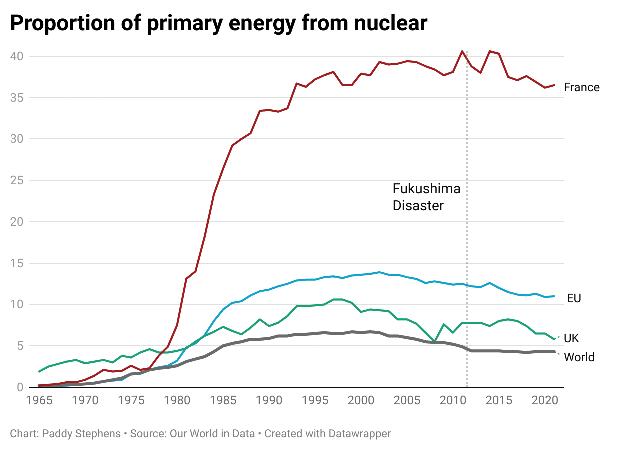
15 SciTech
Biden's 2015 visit to the European Parliament (European Parliament)
PALATINATE | Thursday 27th October 2022
The Big Bu erfly Count: where have they gone?
Eve Kirman
When it comes to news regarding the environment, it often (disappointingly) comes as no surprise when headlines are mostly negative. Topics that would once evoke anxiety and unease in readers are now becoming so common that it could be argued many people are growing desensitised to the climate crisis. However, for me, some environmental updates can still hit with just as much surprise and disbelief as when I first learnt about them. One of these stories that has elicited this reaction most recently, is the somewhat dystopian notion that bu erflies may be disappearing.
For the third year consecutively, Bu erfly Conservation, an organisation that works to protect bu erflies and moths in the UK, has recorded its lowest average abundance since counts began thirteen years ago. As a citizen science project, Bu erfly Conservation’s ‘Big Bu erfly Count’ relies on the public to
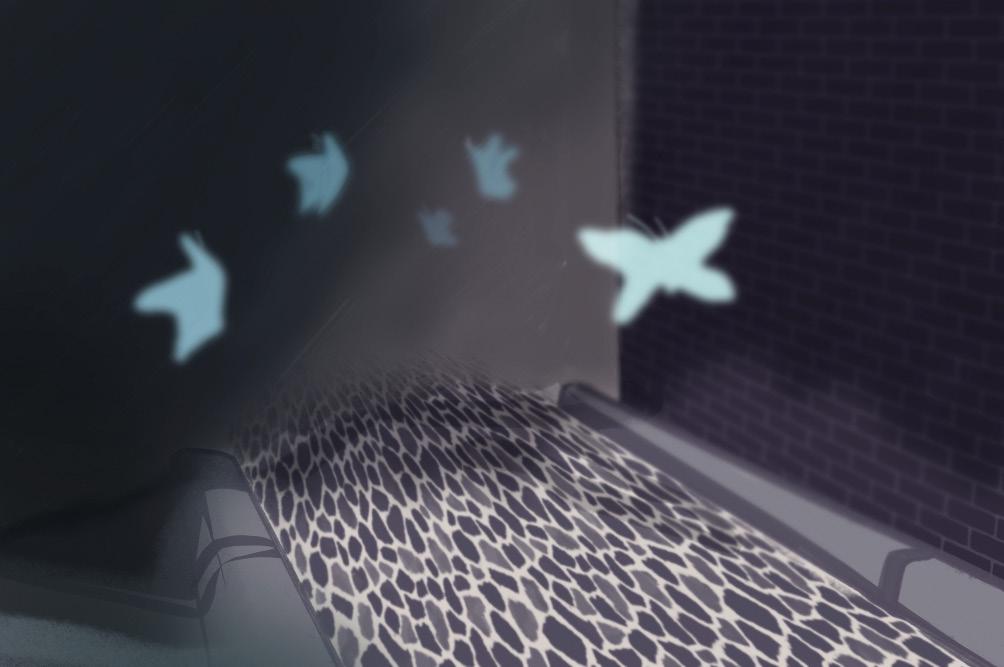
identify and count the bu erflies seen in their gardens. This year’s count took place from the 15th of July to the 7th of August with the results revealing that a figure of merely 9 bu erflies were seen per Count.
bu erfly populations declining?
Dr Fox claims that “the fact that more bu erflies weren’t seen is concerning and it’s clear that much more needs to be done to protect and restore habitats to aid nature recovery. The sun could shine for days on end, but we still won’t see more bu erflies unless there is habitat for them to thrive in.”
Zoe Randle, senior surveys officer at Bu erfly Conservation, agrees with Dr Fox in that the answer lies in habitat changessuch as urbanisation. Bu erflies were seen to be disappearing faster in urban areas as opposed to the countryside due to factors such as increased paving and plastic grass
(Anna Kuptsova)
as well as increased nitrate levels from cars.
Due to the uncharacteristically hot weather this summer, bu erflies did appear a couple of weeks earlier than they usually do. However, with this taken into consideration the result was still discouraging. The findings weren’t entirely negative, however, as some species have experienced a large population growth since the last count. Sightings of the Common Blue and the Holly Blue increased by 154% and 120% respectively, which is hopeful considering both species had their lowest counts ever recorded in 2021.
Dr Richard Fox, the Head of Science for Bu erfly Conservation said that scientists “expected this summer to have been a much be er one for bu erflies given the good whether in many parts of the UK.” However, he acknowledged that weather conditions are not the only factor contributing to the survival of bu erflies. So, why are
Nevertheless, these findings stress the need for changeotherwise we may be watching one of the country’s favourite garden inhabitants become extinct. Randle hopes that people can be proactive in providing bu erflyfriendly habitats in their own garden. This includes allowing grass to grow longer and even promoting specific plant species in order to allow these insects “space to feed, breed and shelter”.
Do we have an eco-crypto? Exploring The Merge
Will Brown SciTech Editor
Much has been criticised about cryptocurrencies, but no criticism has loomed larger than the environmental aspect.
We see articles explaining how Bitcoin is using more energy than the entire country of Norway, how Ethereum requires more electricity than Austria. In a world where the climate crisis is an ever-increasing threat, people were understandably concerned that the latest trend in finance was significantly contributing to the damage wreaked upon the Earth.

Yet throughout all of this there was a recurring hope amongst cryptocurrency enthusiasts –The Merge. Cryptocurrencies are complicated at the best of times, and this is not exception. Bear with me.
The electricity requirement for cryptocurrencies is the result of the ‘Proof of Work’ system. In order to make cryptocurrency networks secure, the ‘Proof of Work’ system forces computers to solve arbitrary mathematical problems. This prevents people cheating the system, and is at the heart of the cryptocurrency mining we hear so much about. At scale, this requires an absurd amount of computing power and – by extension – electricity.
But there is more than one way to secure a cryptocurrency network. An alternative is the ‘Proof of Stake’ system. Whereas Proof of Work uses computing power to prevent cheating, a Proof of Stake system requires you to stake cryptocurrency in order to make transactions.
Think of it like a deposit: If I cheat the system, I’ll lose my deposit. If all goes well, I get it




back. Crucially, this method uses far less electricity. The Ethereum Foundation predicted a 99.95% drop in electricity consumption if they switched to this model.
So that’s exactly what they did. It took a while. Ethereum’s transition had been ‘coming soon’ for the last seven years, and some doubted whether it would even happen. But then things began
miners have since closed their operations. So, whilst it may not be quite a dramatic decline as advertised, it appears there has been a measurable decrease in the environmental damage of Ethereum due to this transition.
So, what does the future hold for cryptocurrencies after this event?
I spoke to Dr Carsten Sørensen, associate professor of Information Systems and Innovation at LSE, to try and learn what the Merge could lead to in the future.
Dr Sørensen emphasises that it is “too early to say” what the impacts will be, and there is much uncertainty around “how much the change will affect the uses cases that will flock to Ethereum and make it more valuable as a rightsensitive digital infrastructure.” Sørensen notes that the technology is always evolving, and up-and-
coming cryptocurrencies like Hedera are looking to replace Ethereum with a more efficient network, just as Ethereum originally a empted to do with Bitcoin.
Prior to The Merge, it was often argued that Ethereum’s success would prompt other cryptocurrencies to do the same. As Bitcoin is the largest consumer of electricity within the cryptocurrency world, I asked Dr Sørensen if he felt Bitcoin would follow suit:
“[I]t seems highly unlikely that Bitcoin will change to proofof-stake. Within the crypto community, there is a strong sense that proper decentralisation can only be guarded by proof-ofwork consensus mechanisms. […] Ethereum's Merge is, in my view, largely a result of the community


power wielded by the founder Vitalik Buterin and the dominant use-case of Ethereum as an infrastructure for smart contracts.”
Dr Sørensen also noted that whilst the figure for Bitcoin’s energy consumption seems large, it is “a lot less than the domestic use of tumble dryers” – and much of Bitcoin’s energy consumption also comes from renewable energy.
So, whilst the Ethereum merge may have gone off without a hitch, it seems that the future of cryptocurrencies is still up in the air. The reputation of the technology has taken a hit over the last few years, and it remains to be seen exactly how – or even if – it will become more mainstream in our lives.
to take shape. Ethereum tested out a Proof of Stake system on an offshoot of the main Ethereum cryptocurrency known as the Beacon Chain, and it worked rather well. So, last month, Ethereum was combined with this offshoot in (the dramatically titled) The Merge.
Was it as successful as they claim? Perhaps. A report from CoinDesk’s Daniel Kuhn emphasised that whilst the network may be more energy efficient, that does not directly translate into reduced electricity consumption. Cryptocurrency miners have invested significant funds into their operations, and as such it is reported that many have simply transferred to other, less popular cryptocurrencies in order to continue turning a profit. However, Ethan Vera (COO of Luxor Tech, a cryptocurrency mining company) recently tweeted his estimate that 70-80% of Ethereum
(Isobel Warwick)
SciTech 16 Thursday 27th October 2022 | PALATINATE
It seems highly unlikely that Bitcoin will change to proofof-stake
Somewhat dystopian notion that bu erflies may be disappearing
Conservative-run Council denies allegations of incompetence amid £52.4m black hole
Jacob Cousens Politics Editor
The Conservative, Liberal Democrat, Independent coalition on Durham County Council has announced a £15 million overspend for the upcoming financial year, with over £10m worth of cuts to be required from the Council’s budget or reserves, as reported by Chronicle Live.
Conservatives on Durham County Council have been under fire amid allegations of incompetence and recklessness after it has been revealed that it faces a £52.8m black hole in its finances over the next four years.
The council will need to save £37.4m in 2023 to 2024, in large part due to rising energy bills, which reflects an £11.4m increase in the Council’s gas and electricity bills from £7.5m to £18.9m. The protestations of the Conservativeled council have not been well received by the opposition, with Labour councillors not affording the administration much sympathy in the most recent full council meeting. Stanley’s Labour councillor Carl Marshall noted that “the Conservative government stripped almost a quarter of a
billion pounds from [Durham County] Council’s budget during 12 years in power.”
This criticism has persisted; extending from local councillors to Durham’s Members of Parliament, with Mary Foy commenting: “More than a decade of Conservative cuts to local government budgets have already drastically reduced the council’s ability to cope with additional pressures and this year, with the added impact of inflation, councils must have more support from national Government.” Durham North MP Kevan Jones remarked: “It is difficult to stomach Conservative councillors complaining of a £15m overspend when successive Conservative governments have taken over £240m per year away from Durham County Council. If the council are in this position, they need to publish and explain some of their financially illiterate decisions such as the sale of the new purpose-built HQ building.”
In response, the Council has put aside a budget support reserve of £10m to ease pressures on its finances. Chronicle Live reports that Council is expected to lose £42m in reserves this year –
almost 18% of its £235.5m total.
Councillors even within the administration itself were despairing, with Liberal Democrat Cllr Mark Wilkes saying: “We can’t afford the usual delays from central government in confirming funding and we need a response immediately.” He


Department for Levelling Up, Housing and Communities responded: “For Durham County Council, we have made available £503 million for this financial year to deliver services.”
The local bus services, community centres and parks will likely be the price to pay of the absolute decimation of Durham County Council’s finances. It does seem to appear, after years of cuts to local authority budgets, that the council has finally reached breaking point. Local authority funded projects are often the bedrock of struggling communities and this latest iteration of the Conservative party’s austerity programme has cast further doubts on the legitimacy of the “levelling up” mantra, with their critics particularly emboldened by this latest episode of chaos.
Parliamentary selection row sparks resignations in County Durham’s Sedgefield Labour Party
13 elected officials have resigned from Sedgefield Constituency Labour Party – the parliamentary constituency formerly represented by Tony Blair – following allegations of a ‘stitch up’ of local candidates.
Most notably, founder of Socialist Think Tank and local party chair Paul Daly was excluded from the long-list to be the parliamentary candidate.
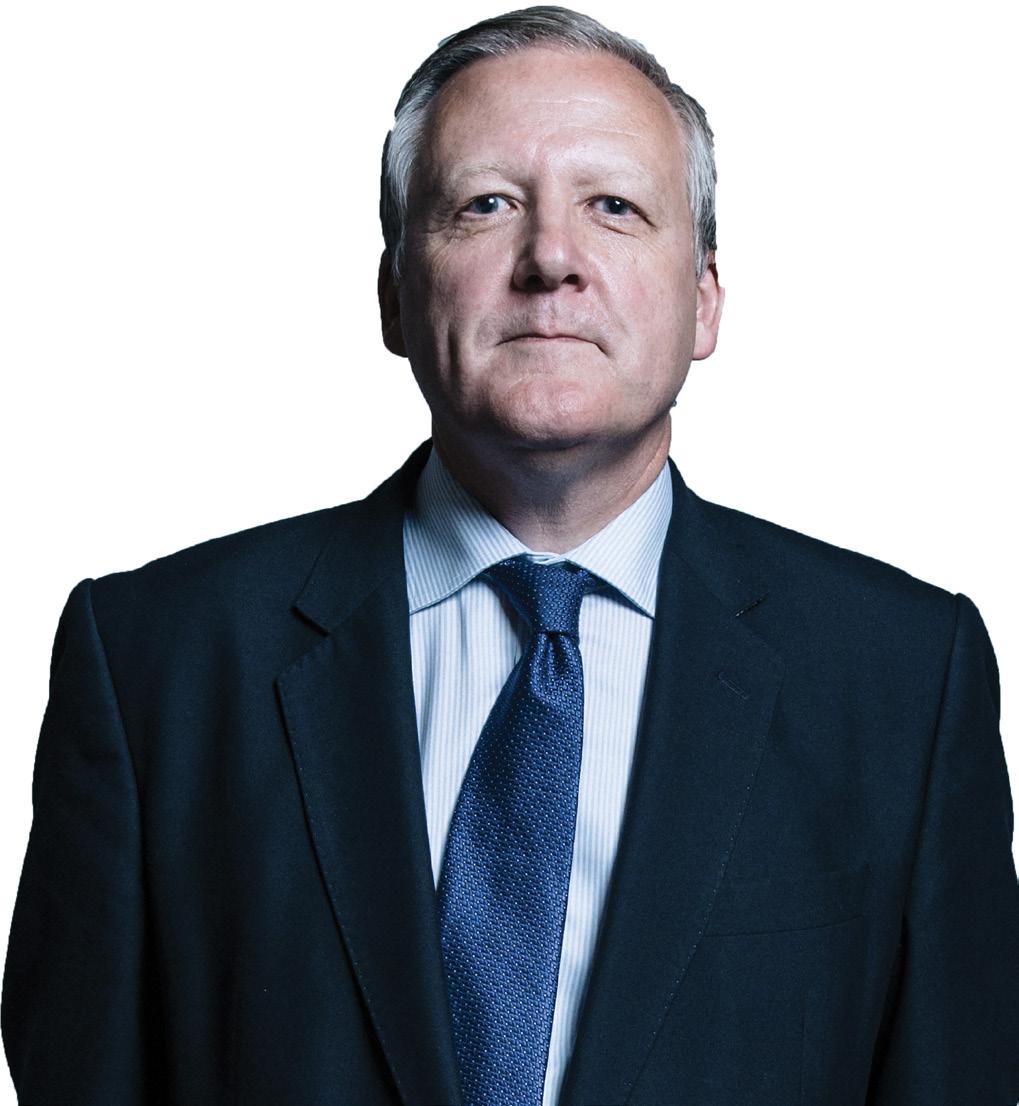
This particular parliamentary selection is the latest iteration of the internal struggle for the heart of the Labour party: one which the current leadership is comfortably winning. Daly, a teacher, who claims to have joined the Labour Party in response to controls on immigration mugs commissioned by Ed Miliband, was a vocal supporter of former Labour leader and Independent MP Jeremy Corbyn. In a long resignation le er posted on his Facebook page, Daly alluded to a strong sense of disillusionment with the current leadership of the party, he also referred to “the tactics used by the Labour Party which will come as no surprise to many.”
He went on not just to criticise the alledged anti-democratic
shortlisting process within the Labour party, but also the dropping of socialist policies from within the party’s policy programme. “While Rachel Reeves seeks to outflank the most hostile right wing narrative on asylum seekers to the right and commitments to removing privatisation in the NHS have become a distant
memory, this is not a direction I can do anything but oppose.


“Many believed that it was a two horse race between the “New Labour” pro privatisation candidate, and me, the democratic socialist candidate.”


Daly went on to a ack the centre left further. On local centrists within Sedgefield Labour Party, Daly noted “there’s about five of them [...] hardly anyone likes them [...] They’d sell their nanny in order to have
By contrast, former Haringey councillor Alan Strickland, who enjoys the support of former MP Phil Wilson, is expected to win the ballot of local members comfortably. A housing association director from Newton Aycliffe, Strickland has won overwhelming support and nominations from five branches thus far.
Remarkably, Strickland managed to make it onto
the shortlist for the previous parliamentary selection to succeed Sir Tony Blair, aged just 22. Michael Crick of Channel 4 noted “it takes something to try for what was then a rock-solid Labour seat when so young.”
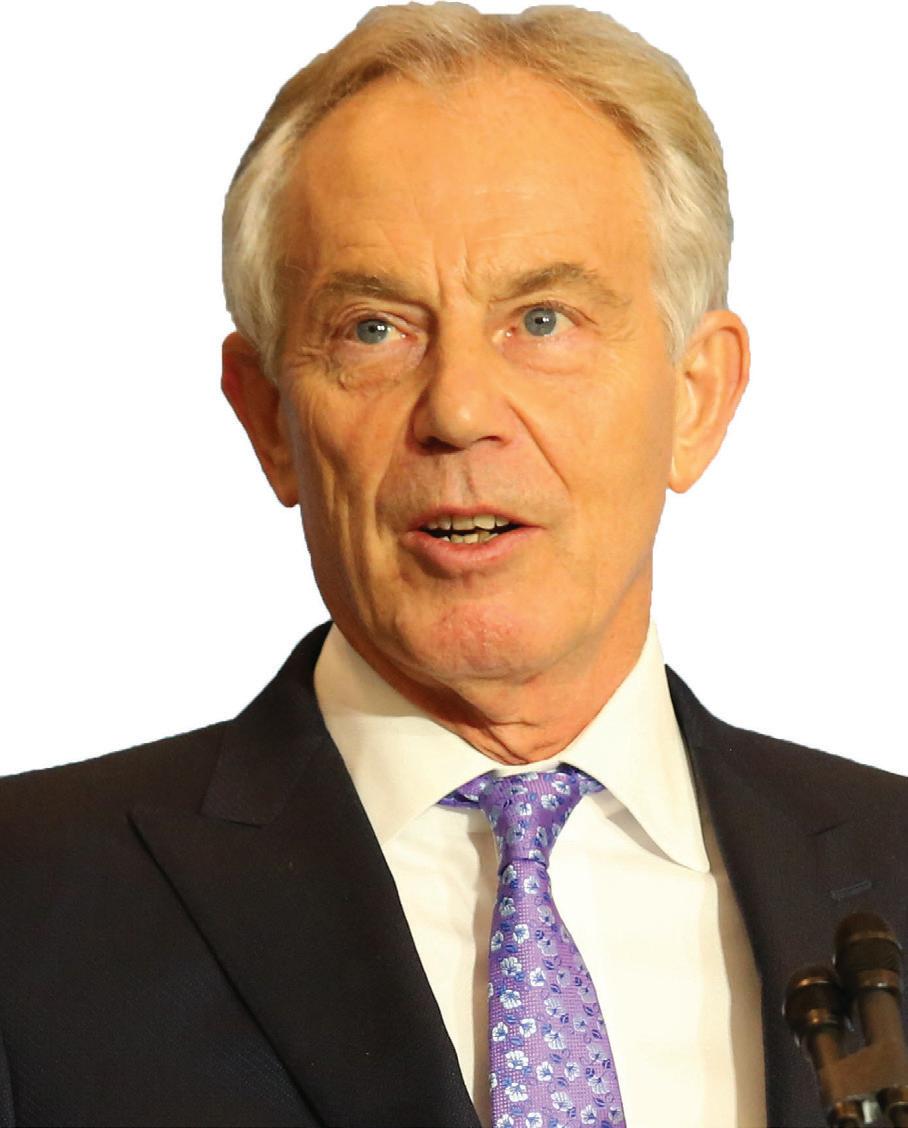
This particular Sedgefield CLP parliamentary selection shows us, if nothing else, that Sir Keir Starmer’s grip on the Labour party has never been stronger.
In Strickland, Labour may just have found the capable political operator it needs to win back the seat at the next general election. No doubt national circumstances favour Labour at the moment: on 21st October 2022 a YouGov poll gave the party a 37% lead.
Is the Labour party still a fundamentally divided organisation? Yes, the fallout from this particular selection demonstrates that clearly. Does this ma er for Starmer? Absolutely not. As time goes on, and Starmer’s lead increases and increases there certainly feels that there is a certain inevitablility to him. For now complete control in the Labour party will suffice. But soon, just as Starmer has – by stealth, ruthlessness and strength – taken control of the Labour Party, he will soon have control of the country.
17PALATINATE | Thursday 27th October 2022
Politics
Antonio Costa
County Durham
Kevan Jones (UK Parliament via Wikimedia Commons)
Make no mistake, the services that councils provide are absolutely essential
While Rachel Reeves seeks to outflank the most hostile right wing narrative on asylum seekers to the right and commitments to removing privatisation in the NHS have become a distant memory
Sir Tony Blair (US Dept of State via Wikimedia Commons)
Does this show Keir Starmer’s grip on his restless grassroots tightening?
Kwarteng: a failed success story?
How Kwasi Kwarteng became the second shortest-serving Chancellor in history
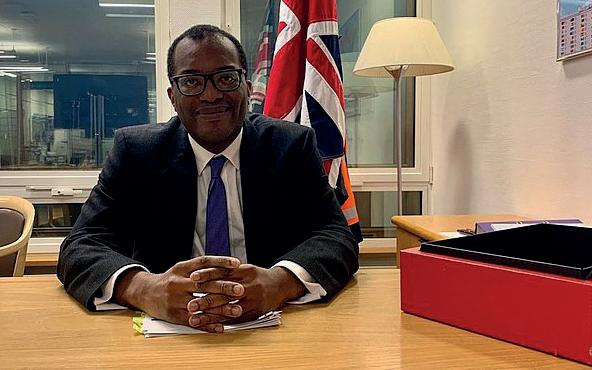 Caleb Tu
Caleb Tu
On Friday 14 October, Kwasi Kwarteng became the latest casualty of the current political malaise engulfing Westminster.




After serving just 38 days as outgoing Prime Minister Liz Truss’s Chancellor, he was instructed to fall on his sword after a week of poor press, a falling pound, and policy U-turns. This makes him the second shortest-serving Chancellor in this country’s history, a label fairly unbecoming compared to the normal achievements listed below his name.
also a promise not to go ahead with a hike in corporation tax. The gist of this mini budget was to grow the pie from which the country may eat, as opposed to apportioning the pie more fairly. The issue came when the markets got hold of this budget and reacted accordingly.
In contrast to Truss, whose politics of yesteryear were more liberal in their persuasion, Kwarteng has maintained a consistently conservative ideology
It is ironic that an economic plan designed to entice bankers and investors could scare them so readily. Confidence in the UK markets fell swiftly after Kwarteng’s economic announcement, with the pound falling to the lowest value since decimalisation in 1971. The party that runs on a claim to prioritise business and growth has seen an embarrassing reaction from business leaders. Even the chairman of Tesco, John Allan, has implored the Conservatives “to look after those people suffering,” stating also that he does not think he has “seen a growth plan from the Conservatives.” As such, an embarrassing series of policy U-turns has been seen.
At the time of writing this article, the current Chancellor Jeremy Hunt has just promised to reverse almost all tax measures from Kwarteng’s mini budget. The basic rate of income tax will remain indefinitely at 20p and, whilst the promise to change stamp duty has persisted, Kwarteng’s headline economic promises have been kicked into touch to foster some confidence in the fiscal management of the economy.
messages being leaked, and Sunak, Mordaunt and Johnson ba ling for Number 10, there must surely be an endgame in mind for Hunt? In the libertarian pursuit of growth, the British heritage of a pragmatic Conservative Party has arguably been abandoned under Truss. With Hunt’s new measures to scrap Kwarteng’s borrowing-funded tax cuts, the markets, fellow MPs, and the public alike can at least see a resemblance of the pragmatic party that once was. This does raise questions about a potential incongruence between Number 10 and Number 11, but economic stability can perhaps be seen as
more pertinent in the current climate than ideological purity within the great offices of state.
With Kwasi Kwarteng now watching this all unfold from the comfortable green backbenches; his imposing professional CV now appears to be nothing more than words on a page. Never has it been more true the saying that a week is a long time in politics. For Conservative MPs watching this saga unfold, many like Kwarteng will be glad of their safe seats, but many will be weary of the political P45 on the horizon. A general election seems more and more likely with every passing day.
Kwarteng and Truss share a similar political ideology. In contrast to Truss, whose politics of yesteryear were more liberal in their persuasion, Kwarteng has maintained a consistently conservative ideology. The son of Ghanaian immigrants, Kwarteng gained a scholarship to Eton College and progressed onto Cambridge University. Kwarteng is vocal in his belief that hard work and persistence yields high office and reward. This can be evidenced by his impressive CV of roles at the Bow Group think tank, JP Morgan, and as the winner of University Challenge in 1995. One can be forgiven for thinking that only in a political situation this volatile could a man with such an illustrious CV be so swiftly removed from office.
The issues for Kwarteng have come thick and fast. His “minibudget” was hellbent on delivering growth and not centring itself around redistribution. Measures included National Insurance increases being cancelled, a reduction of the basic rate of income tax from 20% to 19%, and a decrease in stamp duty. There was
So what is left to inherit for Jeremy Hunt? One would be right to question why such a seasoned politician is boarding the proverbial sinking ship. Truss’s leadership has imploded and she will soon be replaced as Prime Minister, Conservative MPs’ WhatsApp
Politics Explains: the recession

prospective homeowners.
For most, a recession is associated with ideas of high unemployment, a dip in living standards and deep uncertainty. Given that Gross Domestic Product (which measures the national level of economic activity) fell by 0.3% this August, coupled with the economic volatility of the past weeks, many of these financial anxieties will become more prevalent in the public sphere.
In strictly economic terms, a recession refers to negative GDP growth over two consecutive quarters, or two months. In other words, the aggregate wealth the economy generates has declined. For individuals and households, this can create a multitude of problems: businesses will be less willing to invest, and layoffs may ensue; wages stagnate as businesses struggle to afford pay increases; and financial institutions often become more wary of lending, affecting
On 22nd September, the Bank of England announced their belief that the UK was already in recession. The lingering effects of Covid-19 on the workforce, the Russia-Ukraine conflict and high inflation rates – currently at 8.6% as of August – all put significant stress on supply links and consumer behaviour, limiting economic activity and inducing a recession. Since the Bank of England’s announcement, the chaos arising from the “minibudget” and volatility of the British pound sterling have both worsened this risk.



With trust in the UK economy low, a recession not only seems more likely, but potentially more problematic. Foreign administrations seem less willing to lend to the government, and financial groups feel less secure trading in UK markets. This could mean that a recession will be longer and more severe than previously thought, posing a problem for the government.

18 PALATINATE | Thursday 27th October 2022 Politics
Domestic
Kwasi Kwarteng (Department for Business, Energy and Industrial Strategy via Wikimedia Commons
The party that runs on a claim to prioritise business and growth has seen an embarrassing reaction from business leaders
In the libertarian pursuit of growth, the British heritage of a pragmatic Conservative Party has arguably been abandoned
Tom Raines
With trust in the UK economy low, a recession not only seems more likely, but potentially more problematic
When a scarf becomes a noose
The Iranian dictatorship is faced with a wave of protests, as people take to the streets in the wake of Mahsa Amini’s death
Sophia Virgos
On 16th September 2022, Iran’s ‘morality police’ detained 22-yearold Mahsa Amini in Tehran for wearing a loose hijab. They took her to a detention centre, where she fell into a coma and, three days later, while still in custody, she passed away. The authorities claimed that she died of a pre-existing heart disease, but bruises and marks on her body suggest otherwise. The incident has sparked a series of protests around the world, with women cu ing their hair and burning their headscarves in an act of defiance against the Islamic Republic’s imposed dress code. But Mahsa’s case is not an isolated event; in Iran, the morality police has been oppressing women for decades now, and Mahsa’s death is but the tip of an iceberg of repression that dates back decades.
In the 1970s, Iran was a modern, pro-Western country, albeit under a dictatorship, where women enjoyed a large amount of freedom including the right to vote, to a end university, to dress in Western fashion, and to interact with men in public without restrictions. These liberties were severely criticised by the clergy, which was instrumental in the Shah’s downfall. In 1979, the Iranian Revolution toppled the monarchy and overturned the proWestern government, leading to the establishment of an Islamic republic. Ironically, what had begun as a movement against a dictatorship and in favour of social justice, freedom and democracy became a theocracy. Within weeks, the mullahs began their assault on women’s rights, imposing repressive measures to curb proWestern thought and lifestyles, reinstating Islamic culture. Women resisted constraints on their rights. When hijabs were mandatory to enter certain places, they would not wear them. When the veil became an emblem of the return to the old order, and they could no longer refuse to use it, they wore it loosely, le ing strands of hair show under their headscarves in protest. Even when violence and incarceration was instated in 1983 to punish women who did not follow the dress codes, they fought back.
This resistance is what catalysed the creation of the morality police, officially called Gasht-e Ershad, under the hard-line presidency of Mahmoud Ahmadinejad in 2005. Their job is to make sure women, usually above the age of 7, cover their heads and dress modestly in public. Inappropriate clothing can lead to a criminal record, incarceration and flogging to discourage such behaviour. The ‘official’ role of this police system is to protect women since, in the eyes of the government, their clothing choices can provoke aggressive reactions in men; this is what justifies having an extremist squad
patrolling the streets in search of disobeying women. The problem is that the measures adopted by the government to ‘protect women’ have become the tools that strangle them. As author and speaker Parmida Barez movingly puts it, “the scarf around our head [has become] the noose around our neck.”
Progressive societies have naturally been evolving towards gender equality, towards communities where women have a voice and can conduct themselves in equal fashion to men. Authoritarian mechanisms like the morality police refute this normal state of affairs and put a stop to what – given the information and overall education now available – is a logical evolution: women’s rights. They actively curtail the freedom and dignity of a whole gender and violate basic human rights by suppressing peaceful protests. This persecution system is a part of a religious dictatorship and as such, it cannot be removed under the ruling of an authoritarian state, and what’s worse, it has no limits and could end up turning Iran into a place like Afghanistan, where under Taliban rule women have been deprived of all their rights and it is even considered a crime to be born into this gender. This raises questions about the validity of imposing a male view on female morality.
Regional Influence and Instability: the Future of Iranian Theocracy
fervently anti-United States and anti-Zionist actions— and crafting effective policies in response to these.

The 1979 revolution precipitated Iran’s transformation from a key partner of countries such as the UK and the United States into an Islamic Theocracy and one of the Middle East’s most disruptive forces. Pivotal to the regime’s longevity has been “Iran’s hardline leadership[s]…remarkable unity of purpose in the face of reformist challengers” as outlined by Kenneth Pollack. However, in the face of widespread protests and rising discontent, will such unity of purpose be sufficient hold the regime together?
This year, despite increasing criticism, President Ebrahim Raisi has chosen to adopt new measures to monitor unveiled women, such as the installation of surveillance cameras, and to silence protest against hijab rules with the promise of jail. In a country where the role of women is a key element of Iranian state ideology and where dress code rules amount to a reason of state, the only way he can count on the support of the hard-liners is by keeping the morality police in place.
Countries such as the UK are starting to take a stance. In view of the morality police’s abuse and violation of women’s rights, they are actively sanctioning Iranian officials in the law enforcement forces by prohibiting them entry into the UK. It’s not much, but it’s a start.


Either way, it remains the case that Iran’s networks of regional influence continue to generate concern across the international community - whether that is Tehran’s nuclear posturing, support for terrorist organisations like Hamas and Hezbollah or the suppression of freedom of expression at home and abroad such as inciting the a ack against Salman Rushdie.
The core driving force behind Iran’s strategy is its ‘revolutionary’ ideology of Islamic Government, which seeks the unification of church and state and feeds the belief that the regime is leading an existential fight against the forces of imperialism and modernity in the region. Understanding this central belief to the Iranian clerical elite is vital to interpreting Iran’s foreign policy— such as its
Arguably, it was born out of a quixotic combination of pride in Iranian culture and a sense of victimisation. This combination has maintained the regime’s resistance to domination by any foreign power and led it to balk at notions of any form of compromise. Thereby, shaping Iran into a unique type of actor on the world stage - one which combines a range of tactics when engaging with the West which include: testing, exaggerating, bluffing, and counter-threatening. Iran’s uncompromising stance in the Vienna nuclear negotiations typifies this a itude.
Internally, the joint church and state is harnessed to justify the suppression of liberal segments of society and minority groups namely, the Kurds, and to couch the impact of sanctions as the necessary price for “economic independence”. Recently, the government stopped subsidising imports of wheat flour and vegetable oil leading to food prices to increase by 26%, while the overall rate of inflation looks set to reach over 47% by 2023. Moreover, over the past five years, the value of Iran’s currency, the rial, has fallen by almost 90%, causing civil discontent.
In November 2019, Iran experienced internal protests after fuel prices rapidly increased. Yet, this was not enough to result in a wrestling of power from the
Ayatollah’s and the protests were forcefully quelled by Islamic Republic who killed 321 men, women, and children in the process. It seems that the supreme leader Ali Khamenei views the protests in the wake of Masha Amini’s death, for her allegedly ‘immodest clothing’, in the same way as those that occurred nearly three years ago. He has dismissed them as “minor incidents”, and “sca ered riots here and there” that lack the leadership to spur regime change. That said, Khamenei’s doubling down on suppression of the Iranian people, such as blocking open internet access, suggests the protests are of greater concern, and that Khamenei, an ageing and ultraconservative leader, is looking to secure his legacy and the core tenants of a united church and state.
It is plausible that the regime will leverage influence networks aboard especially proxies to achieve this and to distract from internal woes.
In short, regional instability may favour Iranian interests, yet internal divisions have been corroding Iran’s social fabric. The recent eruption of protests has made transparent that Iranians are fed up with growing socio-economic inequalities, increasing levels of corruption, and the continued suppression of civil society.

19PALATINATE | Thursday 27th October 2022
Politics
International
They actively curtail the freedom and dignity of a whole gender and violate basic human rights
Sarah Kuszynski
(Ma Hrkac via Flickr)
Spooky


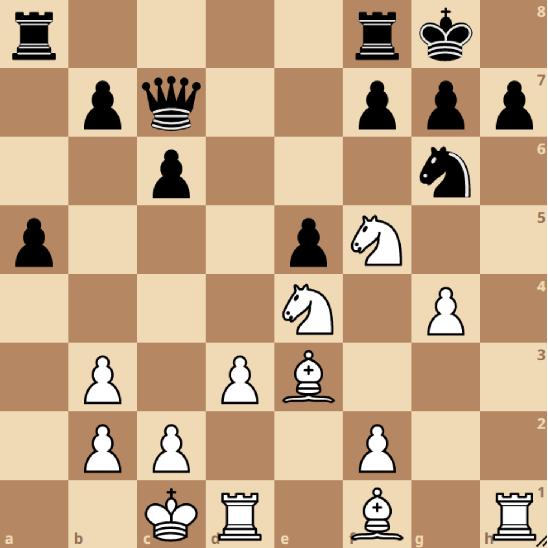



For online versions, answers and more puzzles, head to www.palatinate.org.uk/category/puzzles @palatinatepuzzles Puzzle Editor: Sophie Sherra Chess Puzzles Sudoku 854 20 Thursday 27th October 2022 | PALATINATE Puzzles 7 5 3 8 2 9 6 4 9 1 6 5 8 6 5 3 2 9 7 4 5 1 6 8 9 8 3 7 1 6 5 2 9 3 1 4 8 6 3 9 6 4 1 4 6 5 9 2 Across 1. associated with Egypt 3. what you collect on Halloween night 6. a movie character with blades on his hands 8. ____O’lantern 9. a parody of Halloween films Down 2. Frankenstein has one 4. the sound you make when you are afraid 5. what kills a vampire 7. a haunting figure 10. a place where bodies are laid to rest : ANSWERS Crossword:1.mummy,2.monster,3.sweets,4.scream,5.garlic,6.freddykrueger,7.ghost,8.jack,9.scarymovie,10,coffin. Spotthedifference:1.Extrabat,2.Toprightofweb,3.Eyecolourofcatonright,4.Tailofghostonright,5.Teethofleftpumpkin,6.Pawofmiddlecat,7.Eyesofright pumpkin,8.Pawofleftcat,9.Bloodytearsofrightghost,10.Candlecolour Quiz:1.StrangerThings,2.Spellman,3.7,4.HalloweenHouse,5.chickenfeed,6.4000B.C,7. YueLan,8.BramStoker, 9.trouble,10.alovedoneiswatchingoveryou. Chess:1Bh6Ifgxh6Nf6+Kh8Rxh6withRxh7#onthenextmove.Ifthesacrificeisrefused Bxg7andblackmustgiveupmaterialtopreventmate.
Quiz 1. Which science fctons show is set in ‘Hawkins’? 2. What is Sabrina the Teenage Witch’s surname? 3. How many Paranormal Actvity flms are there? 4. What was the original ttle for Disney’s Hocus Pocus? 5. What was candy corn originally called? 6. When was Halloween thought to have origi nated? 7. What is Hong Kong’s festval of Hungry Ghosts called? 8. Who is Dracula writen by? 9. Complete the chant: double, double, toil and....? 10. What does seeing a spider on Halloween signify? White to move and gain a winning advantage. Spot the Difference Can you find the 10 differences between the two Halloween Images? Crossword This Crossword is Halloween themed! Bonus Question: What does Samhainophobia mean? Answer: FearofHalloween!
Image Credit: Flaticon
Aquarius
20th Jan – 18th Feb
Changes are on the horizon, and this doesn’t just mean changing your bedsheets – which is long overdue by the way. Something big is coming, the likes of ge ing scouted for DUCFS or finding smoked salmon in the reduced aisle.
Pisces
19th Feb – 20th Mar
With your house being out of fairy liquid for the past week, the mound of washing up has never looked, or smelt, worse. Get out of the house, it’s not your responsibility.
Aries
21st Mar – 19th Apr
With Scorpio season upon us, Mars is entering retrograde. This means it’s time to face the music – things won’t stay the same forever. Check those careers emails from time to time.

Palstrology
Taurus


20th Apr – 20th May
Scorpio season, aka cuffing season. Shake it up, try dating again rather than relying on those Jimmy’s hookups.
Leo
23rd Jul – 22nd Aug
As the Sun encounters Saturn, your peers expectations are going to be too much to live up to this weektime to take a break from the drama. Start watching The Kardashians to dissociate yourself from everyday problems.
Gemini
21st May – 21th Jun
The planet of love, Venus, is crossing your relationships sector this week. Perhaps this is a sign that sexy halloween costumes aren’t always that basic.

Cancer
22nd Jun – 22nd Jul
Put that crochet project to the top of your to-do list, it’s ge ing colder and you can’t keep relying on that alcohol jacket for much longer. If in doubt, it might be time to (god forbid) turn on the heating.
HATFIELD
QDear Violet, I am concerned about my flatmate’s alcohol consumption. He frequently stumbles back late, multiple nights, midweek. And we had a health scare when he vomited for 2hrs straight at 3am. I don’t know who I should talk to - his parents, the multiple girls he talks to, a counsellor, a priest? We believe he is using alcohol as a coping mechanism to hide his red flag of a physics degree.


Dear Violet, I have just started seeing a boy, he tells me he is in love with his step-mom (and kisses her on the mouth!). Is this a red flag? I have really begun to develop feelings but unsure if I should still pursue?
Aunty
Virgo
23rd Aug – 22nd Sep
There is no shame in wasting an hour scrolling through TikTok. Rethink what productivity really means. After all, sometimes less is more.
Libra


23rd Sep – 23rd Oct
There is no be er time than now to start that extra reading you promised you’d do two weeks ago. You never know, it might help you remember why you chose your subject in the first place.
Scorpio


24th Oct - 21st Nov
With the sun finally in your sign, it’s your time to shine. Don’t se le for a cringey couple’s costume. Be independent.
Sagi arius
22nd Nov - 21st Dec
You might find yourself the centre of this week’s gossip. Nothing to worry about, your nearest and dearest will stand by you unfalteringly.
Capricorn
22nd Dec - 19th Jan
Plans are, for once, not just stagnating in the group chat. Despite all your housemates’ unique dietary requirements, a Come Dine with Me evening might be fun.
PalatiDates
ADearest reader, I can entirely appreciate how distressing this behaviour must be. First and foremost, I would advise you to stage an intervention for your flatmate. Not sure who to invite? I say the lot of them: parents, situationships, counsellor, priest - all gathered around the next time he comes in paralytic post-night out.
Explain why his behaviour is upse ing to you. Suggest some potential lifestyle changes he might consider making, such as learning the art of sipping rather than chugging. Or perhaps, he could enquire with the university about how to switch onto a degree less ghastly and icky than physics.
ADearest reader, I must admit that this situation is one Aunty Violent has not been faced with before. Since you have blossoming feelings for this boy, the situation is undoubtedly tricky.
I would encourage you to enquire further about the nature of his relationship with his stepmother. You don’t want to be the third wheel in their relationship! Are his kisses to her a formal peck, or more of a freshersnecking-off-in-Jimmy’s variety? Have a serious talk together.
Although I would personally be rather wary, it is okay if you wish to pursue things. The parentchild culture at Durham is arguably equally incestuous!
Bella on Timothy
Initial vibes? He was stone-cold sober, and I certainly was not.
What topics arose? A mutual adoration of Crocs.
How would they describe you? A fantastic dancer, most-likely.
Describe them in three words Goofy, posh, groovy.
Most awkward moment Falling over because I was dancing too hard to Murder on the Dancefloor.
Which Durham college would you place them in and why? Cuth’s – he was in fact in Jimmies wearing college stash…
Did they meet your expectations? Any surprises? He exceeded them in his ability to do the robot to Jerusalem.
Is a second date on the cards? Already seen him again in SNK, so more like a third date…
Marks out of 10: 9
Timothy on Bella
Initial vibes? Ethereal.
What topics arose? The crippling cost of living crisis – prompted by the incredulous 50p increase of Woodgates.
How would they describe you? She told me I looked like a cow in a good way and at this point I’m just going to take it.
Describe them in three words Rah, smooth, hip.
Most awkward moment Jimmies playing a DJ mix of Jerusalem, and me absolutely eating up the dancefloor to it.
Which Durham college would you place them in and why? Hatfield and she should take it as an insult.
Did they meet your expectations?
Beautiful gal, wonderful vibes –expectations exceeded.
Is a second date on the cards? Undoubtedly.
Marks out of 10: 9
are available on Palatinate’s website




PALATINATE | Thursday 27th October 2022
Signups for PalatiDates
This
edition’s date is between Bella and Timothy.
Will
their boogie at Jimmy’s end in love...
Ask
Violet Have a problem for Aunty Violet? Fill out the form via the QR code!
AIDAN’S
PLEASE HELP!!!
Q
21
Gabi Gordon and Eve Kirman, a prophetic pair, look to the stars to offer some essential mid-term wisdom
Durham United: the new kid on the block
Joe Harston
Ordinarily, the 11th tier of the English football pyramid would not be so newsworthy, however for the second consecutive edition, we turn our a ention towards the Wearside League First Division and its trio of Durham-dwelling inhabitants.
At the foot of the table lies the now infamous Durham City AFC, who share the city with Durham Corinthians and Durham United – the la er’s arrival to the division being the product of Team Durham’s recent effort to align their football team with the national successes they have enjoyed within sports such as rugby and hockey.
Coining the move ‘Durham as One’, Team Durham’s men’s football team announced in late July that they would be joining a partnership with local Wearside League side, Durham United –bringing Saturday football to Maiden Castle. The venture was an a ractive one for Team Durham’s athletes but a crucial one for Durham United as their imminent promotion from Division 2 would not happen if they weren’t able to upgrade their facilities. To make ma ers worse, with the prospect of promotion looking unlikely, many of the promotion-winning squad had left the club.
In a recent interview with Palatinate Sport, Team Durham President and former football captain, Alex Zimaras described the timeliness of the opportunity and how the partnership started.
“Adam [Furness] – who was last year’s 1s’ coach and newly appointed Head of Football – and I wanted an outlet for the club at a semi-professional level.
“If you look at all the clubs in the BUCS Prem’, they all have a Saturday outlet playing semi-pro. We are the only ones that are just a step below.
“If we wanted to start a new team we would have been put in Wearside Division 3 and let me tell you that is not a good standard! There wouldn’t be much point.
“So we then got an email from Durham United which said “We’ve just won Wearside Division 2. We can’t go up because of our ground. Are you interested?”
After correspondence throughout Easter term, the partnership was confirmed via Durham United’s website in June and via Team Durham’s social media pages several weeks later.
Admi edly, upon the initial announcement, I pondered whether Durham United had the more favourable side of the deal, however Zimaras quashed such beliefs as he shared his ambitious long-term goals for the future of Durham United with Team Durham’s BUCS performance at the top of his priorities.
“The long-term goal from a uni point of view is to help with BUCS and from a Durham United point of view it’s to get up the leagues and to be the best club in Durham – which we are,” he stated positively.
The need for improvement
within BUCS is evident. Last year the men’s first team narrowly avoided the relegation playoffs on the final day following a tightly-contested victory against neighbours Newcastle. Within the BUCS Premier Division, they are surrounded by heavyweight sporting universities that already have semi-professional football outlets in place. Should they remain in the league, this is a proven way to be er their league position and ba le with the nation’s best footballing universities.
With Durham United being the new kids on the block, I questioned Zimaras on the side’s relationship with the other members of the city’s 11th-tier contingent. After all, teams at this level will be predominantly made up of local talent and will quite possibly feel they have a point to prove as they face off against what is now effectively a university team.
Agreeing, he said, “If you look at our facilities compared to anyone else in that league, we are miles above them. If you walk out an hour before kick-off and you see the track pitch, you think, “This is my cup final. I’m going to show this Durham United team – whoever they are – and ba er the hell out of them.”
So while it would seem that the infancy of Corinthians and United combined with the lack of competitiveness from City seem to deprive us of a fierce rivalry within the Land of the Prince Bishops, a quality se ing such as Maiden Castle is enough to add gravitas to any fixture. Furthermore, as United hosted Corinthians this season, it certainly was a dramatic affair. United were 4-3 victors on the day thanks to a last-minute winner from Jack Gibbons.
expectation as a Team Durham athlete to take precautions in keeping oneself fit, especially for the biggest fixtures.
While Durham United catch up on games missed outside of term time, they play on a Thursday and Saturday as well as playing a weekly BUCS fixture on a Wednesday. Three games a week just within the university team, along with training leaves very li le time for college commitments. Although, it’s not just scheduling that is the issue, the injury risk that comes with college football is the biggest worry for Zimaras.
“The chances I get injured in a college game are more likely than ge ing injured in a BUCS or Durham United game. So it’s up to the individual to an extent but if you play for Durham United on a Saturday then you’re expected not
to play college [football] because you’re just going to injure yourself and you won’t last.”
Nevertheless, to the relief of many college football fans, this expectation of Durham athletes does not extend itself to the Floodlit Cup. With the competition so deeply rooted within the university’s sporting culture –a racting raucous crowds and creating spectacles of unity and college pride – Team Durham recognise the magnitude of the tournament. While these players are treated like athletes, they are also Durham students and deserve to represent their colleges on these occasions.
So how have Durham United fared so far this season? Well, up to now it would seem that they have firmly met their match within the Wearside First Division. A
mixed bag of results would be an understatement, with five wins and five losses from their first 11 games, placing them 11th from 17 teams, at the time of writing.
Results have ranged from an emphatic 9-1 win at home to South Moor AFC to a disappointing 5-0 defeat away to Norton and Stockton Ancients.
As United find their feet within the football pyramid, their start has been an admirably steady one. Team Durham’s adventure into the depths of the English football pyramid is still within its embryonic stages yet their clear ambitions depict a positive future, with the highest ceiling and steepest trajectory of the city’s teams. The signposts point distinctly towards the Northern League – although it may be several seasons away.
Black out or pay out for the EFL?
There are many quirks of English football. Included are Bovril, Match of the Day and the Boxing Day fixtures. But one peculiarity that arguably shapes weekly football more than any other is the 3pm blackout: a period of two and a half hours every Saturday where live football cannot be shown on television screens.
In replacement, many tune in to the various programmes updating viewers of the progress in the 3pm scores, such as Gille e Labs Soccer Saturday. On the face of it, it is a bizarre phenomenon, so much so that it is only England, Scotland and Montenegro that make use of UEFA’s Article 48 – the statute which allows the blackout to take place. But the tradition is nonetheless one which is a staple of the English footballing weekend, having been present since the 1960s.
However, the EFL has now started the process of ending this tradition by opening itself up to broadcast offers for the 2024-2025 season onwards. This will concern the rights to show all 1,891 matches across the lower professional leagues, EFL Cup, EFL Trophy and all end of season play-off matches.
In fact, that has been football’s downfall recently - particularly when you look at the proposed European Super League and the expansion of the number of teams in the 2026 World Cup onwards. Whilst it would be wrong to ignore the potential financial impact across the entire pyramid, this economics-obsessed outlook is problematic in football generally, not least in the case of the 3pm blackout.
typically do not share the same Saturday 3pm culture, meaning a blackout would not have the same effect as it does in the English football eco-system.
Others suggest that the move would help the li le viewer: those who want to watch their own team in England on television who cannot otherwise, whilst those abroad thousands of miles away are able to. But, unfortunately, it is the comfort of watching your team on television which damages the association football tradition that is so strong in England.
So while this opportunity is a fantastic one for Team Durham athletes, we mustn’t forget the hotbed in which Durham’s sporting culture is so deeply rooted – college competition. There have been murmurings across the university about how this new commitment has prevented Durham United representatives from taking part in college football.
When posed with a question surrounding this, Zimaras chuckled before clearing things up very reasonably.
“There’s been a lot of misunderstanding surrounding this. As you can tell it’s a big topic,” he began.
He went on to explain how, while there is nothing in the form of registration issues preventing players from representing their respective colleges, there is an
There is huge debate about this move. The conversation surrounding whether there will be a drop off in a endances for both home and away fans, whether clubs lower down the football pyramid will be affected and, if a TV deal were to be struck, whether the money can be efficiently and fairly distributed amongst the affected clubs are all important debates to be had. But in reality, nobody knows the current efficacy of the blackout and nobody knows exactly what will happen if all games were to be broadcast live.
However, although intimately linked to these financial points, something that is being neglected in the conversation is the cultural argument. Not everything should be judged on the basis of whether there is more money to be made by expanding audiences.




In the United Kingdom, football clubs are often the social hub of towns and cities. They are so important for local communities, whether that be the pubs who survive because of matchdays, or people who sell scarves and programmes at the ground, or those who merely look forward to their team playing and soaking in the atmosphere at the weekend.
Even though there is an implicit economic argument, it is the culture and community that risks being threatened most of all by the removal of the 3pm blackout. This is particularly so in the EFL, where clubs tend to be less sanitised and are closer to their roots. There are plenty of fans who are more casual and are encouraged to go to games in person because of the blackout, which is integral to communities up and down the country.
Many point to the fact that barely any other European nations enforce this rule. However, none of these other countries quite have the same depth of quality and support as the clubs in the EFL.
It is this uniqueness of English football culture that sets it apart from its European counterparts, and thus the comparisons become redundant. European countries
The counterargument is that people just watch an illegal stream anyway. This significantly overestimates how many everyday football fans will actually go out of their way to find a dodgy stream to watch on their laptop on a Saturday afternoon.
Most people are not that digitally savvy, nor are they patient enough to do so. Nevertheless, if the games were legally shown on television, it is the EFL and grassroots football clubs and their communities who would feel the repercussions.
It is also crucial to remember that the broadcasters and many of those involved financially with football clubs do not care so much for the communities where the football club is the heart and soul. Instead, they care more about potential profit.
Whilst perhaps they feign solidarity with the average television viewer, in essence this proposal ultimately aims to expand television audiences for corporations to increase their profits. Association football culture is much more important to the beautiful game than the lucrative financial benefit that can be drawn from it by a select few.
History tells us that when it comes down to money in football, the media men and big clubs tend to win in the end. It is paramount that, in the face of this, football is first and foremost for those
22 Thursday 27th October 2022 | PALATINATE
Rob White
Football is for those with nothing but their emotions invested
Sport
The signposts point distinctly towards the Northern League
The “reasonable” leader: Alex Zimaras
Team Durham’s president shares all with Oliver Jervis

It could easily be asserted that leaders are many among the few in Durham. Such individualistic lightbearers can be seen regularly in any college JCR, faculty department, or sports club. Cast your mind’s eye towards your JCR president, rugby captain, or even the kind-hearted frep who dutifully carried all those heavy bags you decided to bring to the city on your very first day.
Durham, it could be said, is designed to nurture such grassroots leaders. However, not all are alike. Some are prone to quiet, but efficient, tinkering behind a laptop or phone. Others prefer to be seen and enjoy building personal relationships with those they are there to help. That rule certainly applies in the case of Team Durham President Alex Zimaras.
An unexpected email landed in the Palatinate Sport email a few weeks ago, inviting us in for an interview with the new student president of Team Durham. Initially, I did not know what to expect. Reports from Maiden Castle have not been of a good nature in recent times, and I half anticipated a telling off. Making friends can at times be hard as a student journalist.
Instead, a pleasant surprise in the form of a warm welcome awaited me in the reception area. I immediately saw why Zimaras describes himself as a “reasonable” leader.
Ge ing the role
Nowadays, Maiden Castle is a bustling beacon of elite sport. On every corridor and in every gym, something of sporting interest is occurring. There were smiles all around as students in those typical ‘DU’ quarter zips and baggy shorts milled to and from whatever training sessions they had in store.
After a period of concerned investigation, myself and Alex managed to find refuge by the gym upstairs, away from the maddening crowd but still close enough to keep an eye on the many plates spinning around the sports centre.
This, I soon came to understand, was typical of a leader like Alex Zimaras. Elected during last year’s Epiphany term, the Durham University footballer enjoys a hands-on approach. When asked about how he got into this position, his eyes light up. This is certainly something that ignites a spark. This is a man who wants to do well with the time he has:
“I came up for pre-season in my first year after being invited. Back then it was two weeks, which is great because pre-season is the best time of university. You’re treated like a professional athlete, so you just go to training and you’re straight in, you meet everyone at the club and you’re around everyone.
First year (in 2019) was good but affected by Covid-19. It was also fun living in college, but I think two terms there was enough! Obviously, my second year had nothing –just all Covid-19, but it was great to be able to actually come out of that in third term and that’s when
my involvement increased. I was treasurer for football but there wasn’t much to do. After that, I wasn’t too sure about becoming club captain. At the AGM I went for it and got it and kind of loved it. It was my own chance to change the club and make it how I wanted it to look.
Now, it’s grown massively. I thought, I wouldn’t mind doing this and being paid to do it. Roles on the executive are brilliant and I would like to say well done to everyone who manages it. It’s all volunteering and you don’t get paid for what you do. I think I spent more hours on the football club last year than on my degree!
Eventually, I got sent an email about the AGM for the Team Durham President’s role.
First it was an application, as well as an interview with the staff members because they need to have a say. In the AGM you’re standing in front of 70 people making a speech. They get their votes in and that was in February. In August it all starts.
You have to be on it; you can’t let it slip because you have thousands relying on you for sport, which is a good amount of pressure because it stirs you to do things. I’ve loved it so far.”
cannot stop with it; you have to keep pushing.
The last thing on there was my drive for media stuff. We have spotlight games now, which we started recently. The aim is to get team captains for a promotional video the day before, so people can see their face and get to know them. This gives the game a bit of a buildup and makes things exciting.
Overall, a lot of the things I wanted to do have started already. There are others in the back of my head, which I want to sort out in January. For example, I want to work with the smaller clubs and help them grow.”
The ‘Women in Sport’ Initiative
Other projects are also ongoing elsewhere. After a glorious summer for women’s sport - which saw triumphant achievements in the Commonwealth Games and a Euros victory for the Lionesses - there is a concern as to where the movement goes from here. Nevertheless, Zimaras has a trick up his sleeve:
“One of the fencing guys came to me with the idea, and I kind of had it in the back of my head, to have different taster sessions with different sports. Each weekend, there will be something new just for women. The aim is once a weekend in first term and then look at how the initiative is going.
We know it isn’t a lot and it’s not ideal, but to start with that’s how we’re going about it. There’s a really good vibe and interest in it across different clubs, with half of them signing up.
Overall, this year it’s about being flexible – especially when considering Hild Bede. The space we have is used very well in my opinion – there’s stuff going on all the time and it’s jam packed.”
Accessibility Issues
Next on the list of tough questions is the issue of accessibility. Although he is not fully aware of certain aspects relating to the problem, Zimaras had this to say:
“I know sport is an expensive department. Obviously, you don’t want it to be and there are ways to go about it. I know there are very helpful bursaries. Trevelyan had a very good initiative for football, in relation to paying subs. I think it is a case of us working with colleges, because we don’t have a set amount of money from which to give bursaries. It is also up to the club.
A lot of what happens with the smaller clubs is they have subs which tend to be low but then you have to pay for training and extra things. Although a lump sum at the start of the year happens at some clubs, when you work it out it is a lot cheaper than smaller clubs paying at each training session.
I agree that some of the prices are high, but when you break it down, it makes sense.”
Cultural (r)evolution
in the TLC and put people into groups. These weren’t random and smaller clubs engaged with bigger clubs, so both could get an insight. We had eight people per table, and it became a discussion about the issues surrounding Team Durham and how to improve things. Then we opened the floor to them.
Loads of people started talking and it worked. We’re going to do more of those and break things down. These are small details, but I don’t think there’s anything massive you can do. It’s about working on things during the year. I only have a year, and there’s only so much you can do, but I’ll work on it.”
An eye on the future
Finally, I ask him what advice he has for this year’s freshers. Having risen through the ranks at Maiden Castle, one expects Zimaras to have seen it all.
“If you’re a fresher, what I would say is throw yourself into everything. When you get to your third year, you realise it goes really quickly. The college programmes do everything, so my advice is to get involved, whether it be on the exec or not.
You learn a lot about yourself and others doing things like thatsometimes not in a great way! Your university experience is what you make it. You choose how it goes, really. I remember my first ever lecture on a Monday at 9am. The lecturer said, don’t let your course get in the way of your degree. I thought, ‘okay’ but don’t take it too far! Durham is tiny and you can do it all, so do it.”
The President’s manifesto
Such comments soon gave me an urge to pry into what he has in store to further the efforts of the recently crowned sports university of the year. Others who have come before Zimaras have sought to help engage with the local community and help out Durham’s smaller clubs, who often operate unheard and unseen in the shadows of their larger counterparts.
It seems that this year is no different to those past agendas; however, there is also an increased focus on internal affairs:
“A lot of what was on my manifesto will be looked at over the next few months as the day-today administrative work is chaotic.
At this point, I’ve managed to get the vice presidents’ panel up and running. There are five students on it, and I talk to them, give them some thoughts, and they tell me what students think.
There is a deputy who is essentially a soundboard for that panel, someone doing EDI, someone doing alumni, someone doing welfare and a marketing and promotion person
Already this year, we’ve done some great things with it. I want to also bring back the Team Durham culture and ethos. There’s massive room to get that back and I think we’ve done a great job with it. You
All the money spent goes to charity and we’ve made it so the bookings are free as well to build this ‘women in sport’ idea. Ideally, we want some women only hours in the gym but the capacity here is an issue. Something like this, you need to keep pushing towards the end goal.”
Despite this all sounding well and good, one quality such projects require is sufficient capacity. In 2017, Maiden Castle was selected as one of the major aspects of the ‘Estate Masterplan’ programme launched by the university hierarchy.
Substantial renovations soon came in its direction; nonetheless, there are worries that an overcrowding problem is on the rise. On how this issue will be tackled, Zimaras said:
“The annoying thing is that Hild Bede shut. Although we’ve got it back now, we only have a li le bit. For example, boxing is a problem. We can’t move the ring like you could when handling a volleyball net. We are struggling for space, but we can get through it by planning ahead. So, if clubs - like SU clubs - come to us and say they want to be part of Team Durham, it’s about thinking. Now we’ve got 60-odd clubs, we need space for them before more can come in.
It’s also about being direct and honest. People appreciate you talking to them straight and giving them reasons for your decision. In terms of space, there isn’t much that can be done.


One concern of he which he was certainly aware was the supposed toxic culture that has been bubbling at Maiden Castle, culminating in a Palatinate report claiming issues of racism, elitism and intimidation. Since his tenure began, Zimaras has been working to ensure such problems do not arise again:
“The university have appointed a new pro vice chancellor for EDI, and he is very keen on ge in sport. He wanted a form detailing the background and demographic of those participating in university sport, and we were already developing it.
his team and he can decide what to do with this information. This is a massive step, as we’ve never had it in place before. We can start to see who is who and who’s what.
the way to tackle it is through li ma we had our exec training in fresher’s week.
just have club captains si lecture hall probably not paying attention and playing on their laptops and someone at the front just talking. we tried to make things more interactive. We booked
Thus, it appears that the reins of Maiden Castle are in safe hands. The problems of yesterday remain, but work is being done to break down certain, ancient barriers to sport at the university. Several dam busting projects are already underway, and the rolling fields and artificial pitches of Durham’s principal sports centre are bursting with life as the new academic year begins to stretch its legs.
One hopes that such positive change continues into the future. Only the knowing tales of time will tell for sure.
An extended version of this interview can be found on the Palatinate website.
23PALATINATE | Thursday 27th October 2022 Sport
You
have thousands relying on you... I’ve loved it so far
Durham suffer an underwhelming 2022 County Championship season
 Sanjay Suri
Sanjay Suri
Durham endured a challenging season in the 2022 County Championship, finishing sixth in Division Two. Draws were the theme of their campaign, especially at home, which quickly put an end to any potential promotion charge.

Just one win from the first 11 games — versus Glamorgan — exposed Durham’s weaknesses, and they will be hoping for a faster start to next season as they push to rejoin Division One before potential changes to the league structure in 2024.
Ba er Alex Lees and seam bowler Ma hew Po s both put in performances strong enough to earn England selection, with Lees scoring 651 runs in just seven matches. His high-score of 182 notout in the season opener in Cardiff was particularly special, especially given that he carried his bat under pressure and, if it wasn’t for the rain, would probably have won the game for his team.
Whilst the internationals starred on the domestic stage, many of their teammates wilted
Despite consistently scoring decent runs for his team, Lees failed to win many matches, due to a combination of rain, flat pitches and his team simply le ing him down. However, he missed most of the summer, having been called up to England’s Test squad and, with his departure, Durham unravelled.
Po s on the other hand finished his season with 58 wickets, second only to Middlesex’s Toby RolandJones. Six five-wicket-hauls — more than anyone else in the division — further established his credentials for a spot in the England team, as Brendon McCullum seeks longterm replacements for aging legends Jimmy Anderson and Stuart Broad.
Fortunately for Po s, his England career rarely got in the way of his county season, and he was able to excel on both stages. He will be looking forward to 2023 and is expected to feature more for England. Unfortunately, he, along with Lees, have been dropped for the upcoming Test series against Pakistan in December.
Whilst Lees was expected to be dropped, Po s’ omission came as more of a surprise. Perhaps this is due to the nature of sub-continental pitches not suiting his bowling style and hopefully he will be back in the squad for the trip to New Zealand and the upcoming home Ashes series.
Whilst the internationals starred on the domestic stage, many of their teammates wilted. Ben Raine and Chris Rushworth both produced decent returns with the ball but, other than that, nobody took the opportunity with both hands.
Runs were never a problem for Durham, often encountering flat, predictable pitches, and five people scored over 500 runs. However, nobody was able to break the 1000 run milestone, despite nine ba ers doing so in the league. A lack of consistency in the top order often meant that tight games rarely went Durham’s way.
Towards the end of the season, Durham University’s very own Chris Benjamin was able to make his Durham debut, scoring 82 not-out against Sussex in his first match. The young wicketkeeper is full of potential and hopefully he can carry his form into 2023 to give the team a much-needed boost.

To add insult to injury, Durham were docked ten points, following Aussie Nic Maddinson’s illegal bat in their draw versus Derbyshire. Having faced just one ball, umpire Hassan Adnan called for a break in play, in order to measure the bat. The bat was deemed to have too thick an
edge and was consequently illegal. It was rumoured that the only reason that the bat was illegal was because there was too much tape on the bat making it too thick.
This incident begs the question whether a ten-point deduction was fair or not, given that this was completely accidental from Maddinson and would hardly have given him any performance advantage. Yes, you have to draw the line somewhere, but surely just a reprimand or a small fine would be more suitable, especially since Maddinson changed his bat immediately after, and only scored eight runs in the end.
Apart from Stokes, Lees and Po s are Durham’s only England internationals, and both of them are on the fringes. On the one hand, this could be a positive as it means that their star players might not leave when England’s summer season kicks off. On the other hand, it exposes a lack of quality and experience in the squad.
Having said that, players with lots of county experience are invaluable.
Durham’s very own Will Smith used his experience and match awareness to win four titles as a player, including all three of Durham’s championships in 2008, 2009 and 2013. Or how about Darren Stevens? Despite being well into his 40s, he is continuing to help Kent enjoy success.
The other potential path to success is recruiting experienced international players, who are trying to play themselves back into form.
Volleyball Team Durham Volleyball make history
Team Durham’s volleyball team made history in the second round of BUCS fixtures. Each team were 3-0 victors on the same day for the first time ever.
Boxing Marshall defeated on points by Shields
Hartlepool’s Savannah Marshall took Claressa Shields to a points decision in their bout for the undisputed middleweight title. Shields was awarded the victory by unanimous decision.
The fight was one of the most highly anticipated in women’s boxing history with both fighters boasting an unbeaten professional record before the first bell.
Sadly, for our region’s representative, she was dominated throughout by a boxer who many consider to be the greatest female boxer of all time.
The event made history as the first time two female boxers had headlined a major venue in the UK, as the all-female card fought in front of a sold out O2 arena.
Football Durham United on top on derby day.
Maiden Castle hosted a 4-3 thriller as Durham United welcomed Durham Corinthians.
If you look at their squad, there is a distinct lack of firepower. Ben Stokes’ international success has been a double-edged sword for Durham. The England skipper no longer has time to take part in the county season and is in a phase in his career where he is managing his loads both physically and mentally. His retirement from One Day cricket is evidence of this and it is highly unlikely that he will play for Durham again whilst he is still an England regular.
Kiwi Rachin Ravindra played one match for Durham this year, scoring a double century, despite being a bowling all-rounder. Cheteshwar Pujara also rediscovered some of his form that made him the star of India’s Test team, almost carrying Glamorgan to promotion.


Sixth place in the bo om division of the County Championship is not where Durham belong. A full shakeup of the squad might be needed, and a blend of experience, youth and international quality is paramount. There are flashes of promise, but Durham need to do so much more if they want to get promoted, let alone win Division One of the County Championship.
United’s goals came via a brace each from Jack Gibbons and Ned Ventham: the second of Gibbons’ goals coming in the dying embers of the game.

United found themselves three goals to the good after 22 minutes but an inspired comeback from the away side looked to earn Corinthians their share of the spoils before the last minute winner.

Sport
24 Thursday 27th October 2022 | PALATINATE
Want more from Pal Sport?
“Throw yourself into everything.”
Oliver Jervis interviews Team Durham President Alex Zimaras.
“The highest ceiling and steepest trajectory of the city’s teams.” Joe Harston reports on the progress of the ‘Durham as One’ venture.
(Banner image:
Alex Zimaras)
Instagram: @palatinatesport Twi er: @palatinatesport Email: sport@palatinate.org.uk
Players with lots of county experience are invaluable
(Maddie Parker)





















 Daniel Hodgson News Editor
Daniel Hodgson News Editor












 Duru Akin
Duru Akin


 Holly Downes
Holly Downes


























 Caleb Tu
Caleb Tu

























